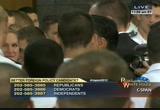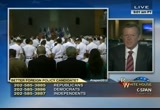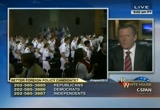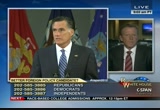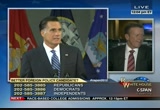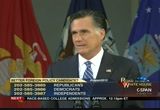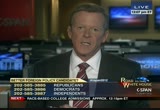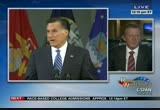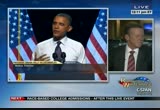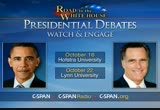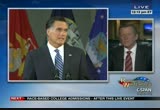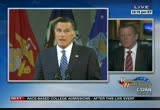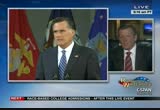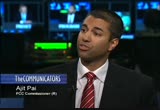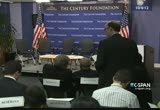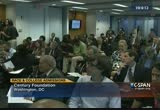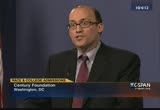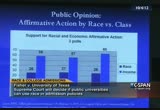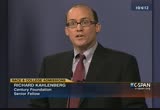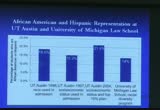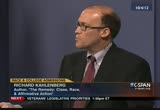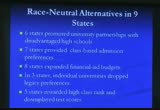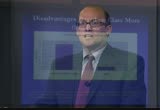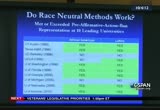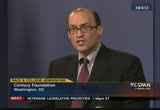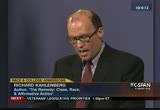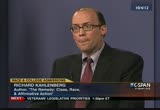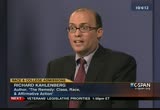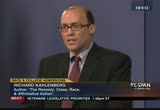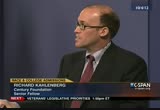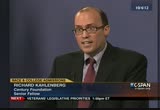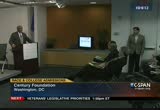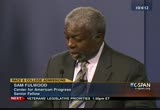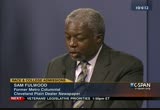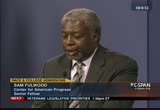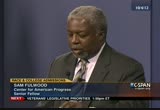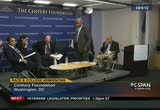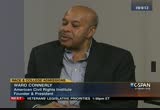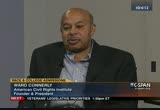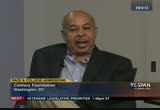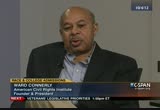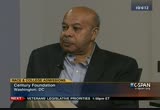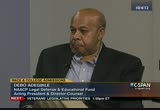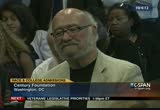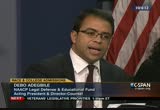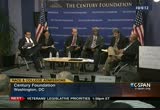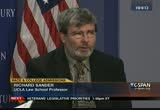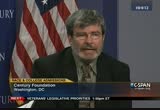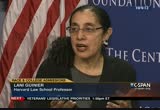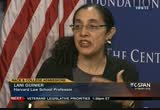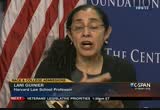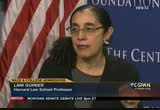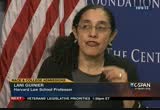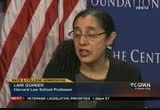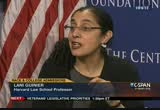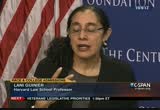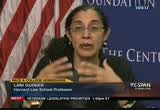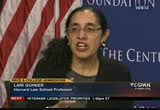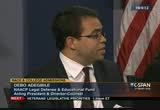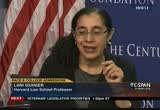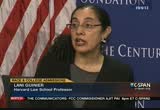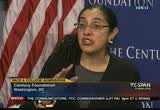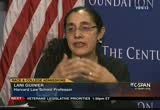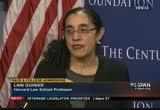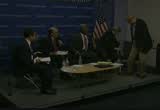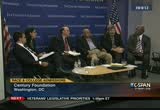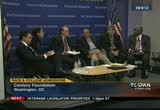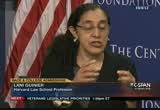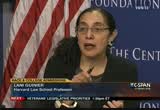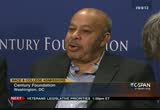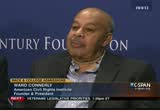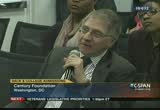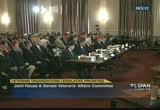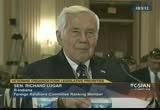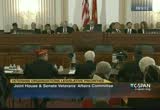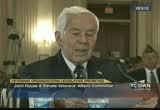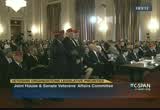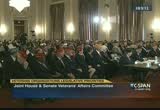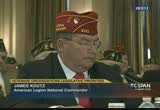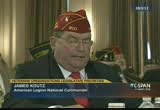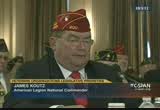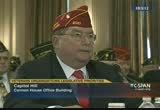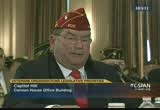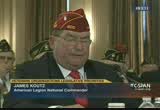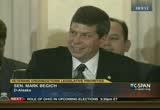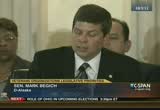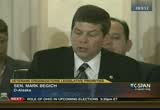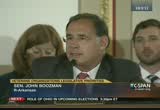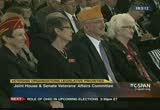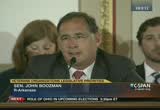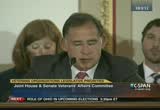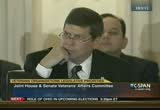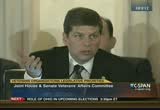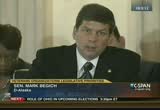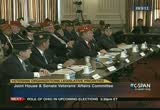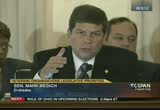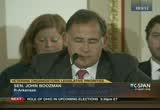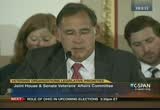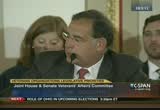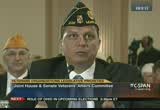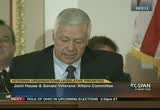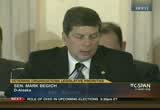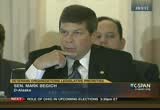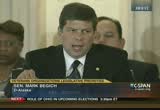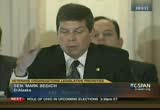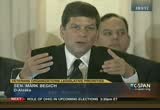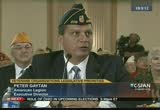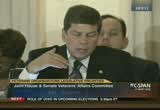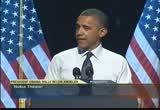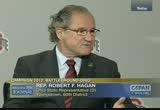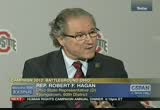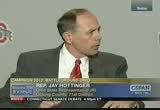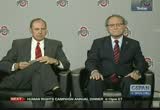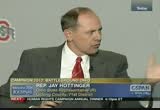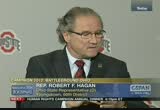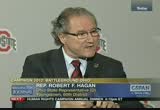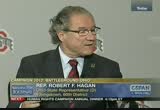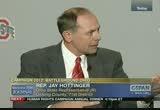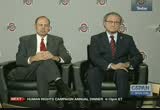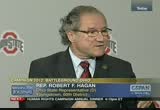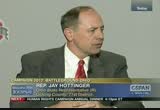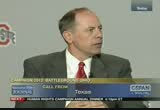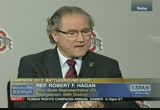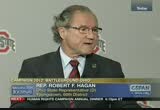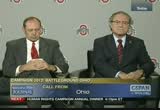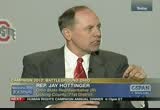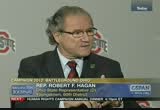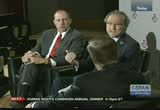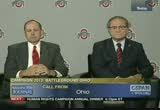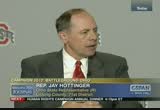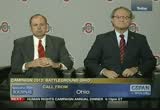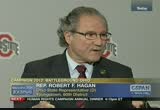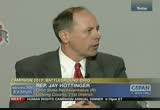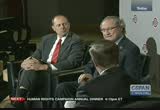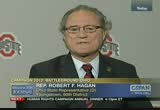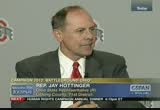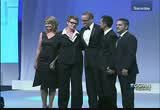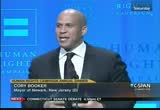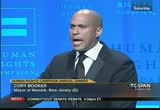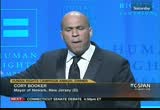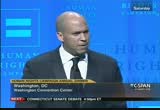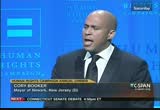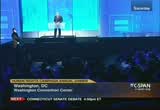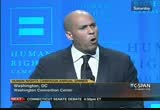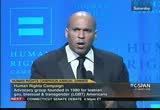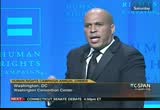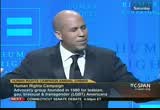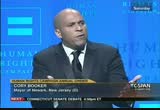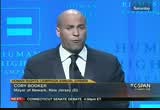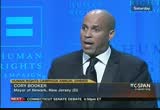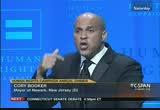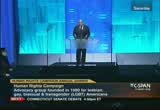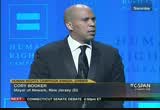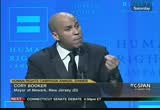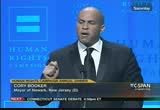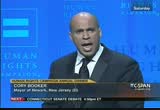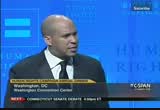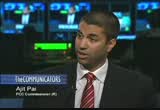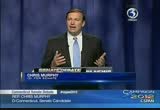tv U.S. House of Representatives CSPAN October 8, 2012 12:00pm-4:59pm EDT
12:00 pm
12:01 pm
nato, as well as a general outline of his approach to foreign policy. we want your reaction. you can see the numbers up there on the screen. you can also send eight weeks. we are using the hashtag #cspan 2012. what did you think of this speech? caller: i think governor romney is trying to propagate a policy that he really does not have any experience in. the things that he says are good. they sound good. but i think the american people and the people of the world are just really not into being the
12:02 pm
police of the world, as governor romney is suggesting in this speech and lately since the debate. i think, again, it sounds good, but i do not think it is good for the country. host: our next call comes from battle creek, michigan, on our independent line. caller: i am ex-military, and i fought in desert storm. yeah, i think it's a lot of words. i have heard the same song and dance before. host: you got to turn the volume down on your tv. caller: ok, sorry. host: what specifically did you think was a lot of words? caller: about how his policies
12:03 pm
would be very strict on these other countries, and now he would be able -- it just seems like the same song and dance to me, and he does not have any experience dealing with foreign policy, so how can he say it is going to be this and that in foreign policy? host: is that any different from all president obama four years ago? caller: no, and i agree but that, it also. it is the same song and dance we have had the last four years. looks like we're on to have another four years about. host: what did you think of romney's proposal to bring an aircraft carrier group back to the middle east?
12:04 pm
caller: it would probably be good for the economy, getting a few people back to work, but as far as driving people away from home again, nah -- host: thank you for calling in. next up is charlotte in georgia on the republican line. what did you think? caller: and so impressed with governor romney. i am so excited to vote for a president that has america plus interests at heart. i believe this man can turn america crown. -- around. [indiscernbile] and knowledge that we are not going to stand for it, this nonsense going on overseas,
12:05 pm
america needs to wake up and look at this man and vote for romney. host: that was charlotte in georgia. we received several dozen tweets on this issue. i want to read some very quickly. paul says romney will have an unapologetic for policy. he is a leader we need and deserve. dom says not impressed, mitt. leo -- is this speech about a bomb or foreign policy? he does not have one. suzanne says clear conditions for aid to egypt, including honoring peace treaty with israel, way to go, mitt.e and from weston, romney says
12:06 pm
u.s. mess lead in the world. caller: 84 taking my call. -- thank you for taking my call. romney gave a good speech. we have to go and find out what happened to [indiscernbile] that the obama people tries to play like -- not to worry about it because the election is coming up. one thing that they try to [indiscernbile] but anyway, the governor looked very presidential, super good to me, and they like to make him but theyig bird, like aiar, do that to all the good people that try to run. we do not want this -- i am
12:07 pm
cuban. countryt want this to to go the same way down. we have to go for romney number one. thank you for taking my call. host: governor romney will be in newport news, virginia, later today at 5:20 p.m. for a rally. the president is in california. he is dedicating the seas are chavez national monuments has fund-raisers up in san francisco. paul ryan is in ohio and in michigan. vice-president biden is practicing for his debate, which is thursday night in kentucky. you can watch a number of
12:08 pm
different cameras and events surrounding the debate. you can also follow tweets that are being tweeted about the vice-presidential debate. you can see our debate preview program beginning at 7:00 p.m. the debate begins at 9:00 p.m. and then falling we will get your reaction. erick is an antioch, california. what did you think of the speech? caller: not that much. during the debate i was really impressed with the governor, but at the convention there was not one word about any of this and now he is talking like it is the biggest issue. it sounds like leading from behind, which is what he criticized before. it seems like if mitt romney twins, it sounds like we're
12:09 pm
going to funding the military- industrial complex and not much else. that is all i have to say. host: roger from virginia on democrats line. caller: thank you for taking my call. that is grundy, virginia. [indiscernbile] host: do you think it was a good idea to sign those three trade deals? what the governor met was those deals have already been in march prior to the obama administration. but they were signed, you were right. caller: the one with colombia, i think he should have done it more with the unions there. host: where is grundy?
12:10 pm
caller: in the western part is the state, buchanan county. host: the candidate were in that area? caller: they were through, but i did not get to attend. i do not get around to good. host: that was roger calling in. next is george from corpus christi, texas, another democrat. caller: a have been a democrat almost all my life, but the last election, i thought president obama was unqualified and he was just too young. jfk at least had a lot more political experience and was a war hero, but obama was way too
12:11 pm
far to the left. [indiscernbile] the main task of the president is to protect -- the constitution said, and i have always been a constitution fall wower. i think he has come too far, this president, and i am going to probably going to be switching to an independent, and i will probably vote for romney. i am not sure yet, but romney seems to be more moderate and centrist, like clinton was. clinton was a good president, not counting the personal dalliances which did not mean
12:12 pm
anything anyway. i am going to vote for romney and it might be different. host: that you, george. the vice presidential candidates debate this week on thursday, but there are two more presidential debates coming up, and here they are, october 16, a town hall type debate. finally, october 22, at lynn university, in florida. that one will be focused on foreign policy. rick in maryland, independent line. what did you think of mitt romney's speech on foreign policy from the virginia military institute? caller: good morning. thank you for accepting my call. i thought it was a lot like the
12:13 pm
george bush's policies, did not make very much sense. i spent 19 months in iraq, and i listened to the story line they had us there, and it did not sound good then, it does not sound good now. i made money. he seems to be promoting the same thing, and i'm scared. i mean, it does not do anything to put us back in the driver's seat. look at the 19 months i served, and i thought it was more of the same, and i am really tired of it. i am really tired of it. i am probably -- and i have not voted in a while, but i will vote for obama this time. host: that was rich in maryland. some more tweets --
12:14 pm
12:15 pm
israel, unlike our current president, who decided to make a telephone call to the prime minister. i feel mitt romney has the qualifications. he has led. he has run a business. romney was -- i am sorry, i mean, obama was a community organizer. he did not get vetted proper light, and i feel romney has done more than being vetted, and i pray for our country and for the republicans this year, thank you again. host: this is john in wisconsin on air democrats line. hi. caller: jeez, what a debacle. six weeks ago he was saying that russia was our number one foreign policy emanate, and now
12:16 pm
he is talking about everything but. this guy has more bases than sybil. he was talking in libya, it was mission creep. now he is advocating mission creep in syria. the cuts that he was lambasting about the pentagon, is vice president voted for. what is it? besides these pentagon cuts, a lot of the pentagon is for, and they are trying to push things on them that they do not even want, and then to talk about building all these ships and submarines and missile defense? this is not the cold war. i mean, the guy is talking like he is in a 50's in some of this stuff. it is just eleludicrous. the american people cannot see this for what it is, and the neocons and the bush administration are pushing this
12:17 pm
agenda, and we want to go back to that? when are we going to learn? and then these people talking about community organizers -- c'mon, get with it. from mitt romney's speech the virginia military institute, we will reeric this evening on c-span at 7:25 p.m. eastern time. if you watched "washington journal," you saw we were based ohioolumbus, ohio, at co state university. the president has a rally there tomorrow, which you can watch. tonight, two live senate debates, the first up, from virginia, tim kaine and george allen running for jim webb's seat, live tonight at 8:00 p.m.
12:18 pm
eastern, and then we will go out west at 9:00 p.m. eastern time between senator john tester and denny rehberg. thank you for being with us, c- span. a lot more on today. >> campaign 2012 debate how website provides coverage of all the presidential and vice- presidential debates, and the only place where you will see our live coverage before and after the debate. the site as each debate question available where you can search and watched by topic. watch stewart-created clips as well and watch reports from reporters at c-span's campaign 2012 campaign hub.
12:19 pm
>> of the things i have heard from a number of companies and individuals is the fcc has sometimes not acted with alacrity in delaying action on other issues, so i wanted to the about different ways the commission could speed up its processes. second, i think one of the key things the commission can do is enable more kinetic industry is to get more spectrum into the commercial marketplace. there have been a number of different proposals, and i take and all of the above approach. i try to think of different ways the fcc can remove barriers to intra schechter investment. for every billion that the private sector spends, up to and 20,000 jobs could be
12:20 pm
created. >> the fcc's newest republican commissioner, tonight at 8:00 p.m. eastern on "the communicator's." the supreme court recently announced they will consider the case of fisher versus the university of texas. the century foundation released class status as a alternative to race-based criteria in admissions policies. they posted this forum. it is about 90 minutes. >> good afternoon, everyone. thank you all for coming. century foundation, which is a small think tank with
12:21 pm
headquarters in new york. we have a small office here in washington as well. it was founded in 1919 by a man whose basement some of you may have visited. i want to recognize the president of the century foundation, who is here today. the report we are going to be releasing was co-authored by me and a research associate at the century foundation who wrote to the back part of the report. in a case of mixed up parties, she decided to go through with her wedding rather than be here today, but she contributed enormously and want to make sure she is acknowledged. i think studying the issue of affirmative action -- i have been studying it for two decades.
12:22 pm
in my mind, the central conundrum is that most people of good will want our universities to be racially inclusive, and at the same time many of us are uneasy with the idea of counting race and deciding who gets ahead. moreover, there are some liberals like me who are worried that the narrow focus on racial diversity in higher education has eclipsed larger issues of class and the quality, among colleges and universities. so, in advance of the u.s. supreme court's oral arguments in fisher versus university of texas, which will take place next week, the century foundation put together a report which i am going to outline which looks at the question, is it possible to
12:23 pm
create racial and ethnic diversity without using race, and instead paying attention to larger issues of economic equality in our society. it is called a better affirmative action. it makes three main points. the first, that racial affirmative action is likely on its way out. affirmative action based on race was always meant to be temporary by those who originally envisioned it, a deviation for a period of time away from the non-discrimination principle. but now there are both legal and political forces that appear to be bringing affirmative action to a end. to begin with, it is highly unpopular among average american voters.
12:24 pm
if you look at the supreme court briefs in the fisher case, you would think there is overwhelming support for affirmative action, as the number of briefs that outline for a higher education, business officials, civil rights groups, that outlined support for the use of race at the university of texas, briefs that are in opposition. but broader public opinion, it appears only about a quarter of the u.s. population supports the idea of racial preferences in college admissions. by contrast, in the second set of figures, the blues set of figures, there is broad support among the same set of voters for preference in college admissions based on income. given these results, it is not
12:25 pm
surprising that ward connerly, who will be on the panel, has been extremely successful in his efforts to ban affirmative action based on race in a number of states. so far, the efforts are 546. -- five for six. five out of six times, voters, when given the option, have said we should and the option of racial affirmative action at colleges and public employment, including blue states like california, michigan, and washington. the second major problem facing affirmative-action, of course, is the legal issue, which will be joined in the fisher case. many people expect the u.s. supreme court is going to curtail or even eliminate the ability of universities to use race in admissions. the court has visited this issue before, in 1978, and then in 2003.
12:26 pm
both times by a very narrow margin, 5-4, the u.s. supreme court upheld the use of modest racial preferences as the only way to achieve racial and ethnic diversity. justice harry blackmun tennessee said in the 1978 case, i suspect it would be impossible to arrange an affirmative action program in a racially neutral way and have to be successful. to ask this to be so is to demand the impossible. to get beyond racism, we first must take account of race. there is no other way. but then texas, univ. of texas found that there is another way to create racial and ethnic diversity. as a set of figures suggest, in 1996, u t austin continued to
12:27 pm
use race in admissions and had a black and latino representation along the line of 18% combined. in the next year, 1997, university of texas was banned from using race by a lower court decision. they saw a decline in racial and ethnic diversity using socio-economic status alone in their admissions process. but by 2004, using socio- economic considerations in admissions and what is known as the top 10% plan, where students to graduate in the top 10% of their high school is automatically admitted, you see racial and ethnic diversity, black and latino representation actually increases above what texas had achieved in 1996. now, we are very clear in the
12:28 pm
report that part of the reason that there are greater levels of racial and ethnic diversity into a dozen for is that the latino population growth in texas during that time period. as a policy matter, i think it is fair to say that texas ought to be pursuing other race- neutral methods of increasing racial and ethnic diversity so that it more closely mirrors the state's population. as a legal matter, the supreme court has never allowed racial balancing with respect to state why populations. instead, they have said it is ok to use race to create a critical mass of underrepresented minority students to have the educational benefits of diversity. you can see from the last figure that the university of
12:29 pm
michigan law school, where they did use race in admission, had a lower level of -- they considered 14% to be a critical mass, much less than what the university of texas achieved through race-neutral means. i think this goes a long way to explaining why most observers think the supreme court is likely to strike down the use of race at the university of texas. the second question we take up, what should replace race-based affirmative action if it in fact is struck down by the u.s. supreme court? in a report, we look at nine states where, because of voter initiative or executive order or legislation, universities -- they did not give up on diversity and tried to find
12:30 pm
other ways of achieving racial and ethnic diversity. these plans were hardly perfect, but in many ways there are better than the old style of race-based affirmative action. you can see that in our analysis, six state street -- six states created partnerships with disadvantaged by schools to increase the pipeline of low- income and minority students. seven of the states provide class-based admission preferences. eight states expanded their financial aid budgets in order to provide support for low- income students of all ages. three states rewarded -- they dropped legacy preferences, which go to the children of alumni, a disproportionate share of whom are white and upper class. three states rewarded students who did well in their high school, irrespective of test
12:31 pm
results. to my mind, these are all noteworthy efforts that we ought to applaud. i wish that higher education have more generally adopted these programs. in fact, since 2010, the century foundation published a book decrying legacy preferences, which we called affirmative action for the rich. i think it is a positive note that states have taken some of the steps. in particular, i want to focus on the class a submissions progress. if we want a system of admissions that is truly fair, we would look not only at how well a student does academically, but also what obstacles they had to overcome to achieve their record. you will see that the research is clear that today disadvantages are far more likely to be based on economic status as opposed to race. this is a study from 2010 which
12:32 pm
looked at what predicts a student's s.a.t. scores, looking at a large national database. they found it if you are the most social economically disadvantaged, you are expected to score 399 points lower on the s.a.t., the math and verbal s.a.t., then the most social economically advantaged. by contrast, the difference between african-american and white students was much smaller, 56 points. essentially, the socio-economic obstacles today, under that analysis, are seven times as large as the racial obstacles. the conflict here is, if you want to reward students to have beaten the odds and done better than expected, we ought to pay much more attention to socio- economic status. what were the results in terms
12:33 pm
of diversity, and in particular, racial and ethnic diversity? our analysis, we looked at 10 leading universities in the states where affirmative action was banned or where universities ceased to use racial admissions. in seven of 10 cases, justice blackmun was wrong. there were alternative ways to create racial and ethnic diversity. at u t austin, texas a&m, univ. of washington, univ. of florida, univ. of georgia, univ. of nebraska, univ. of georgia, the representation of african- american or latino students met or exceeded the representation prior to the then on affirmative action. you'll notice there are three exceptions -- uc-berkeley, ucla, the university of michigan, they did not garner the same amount of racial and
12:34 pm
ethnic diversity using alternatives. but what is notable is that those three universities are the ones that are most likely to draw on a national pool of applicants, which means that the number of black and hispanic students is likely to be depressed for an artificial reason. these are the schools that have to compete with other schools on an unfair playing field against competitors who are free to continue to use racial preferences in admissions. so a highly talented students of color who gets into uc- berkeley without a racial preference is also likely to be admitted to an even more competitive institution like stanford with a racial preference. it is not surprising that
12:35 pm
university of michigan, uc- berkeley, and ucla are having a harder time achieving racial and ethnic diversity than some of these other institutions which do not to the same extent drawn national poll. what about graduate school? rick sander is here from ucla law school. we will hear from him about the program he has set up later on the socio-economic affirmative action. these are the data from 2011. ucla had a strong program of providing a leg up to economically disadvantaged students. you can see that in the data when you look at african american students, 22 of 63 african american students were admitted under the socio- economic program, which looked
12:36 pm
at economic disadvantage since, compared to only 12 out of 382 who were admitted through other programs. that is to say, more african american students were admitted through the socio-economic program than the regular program, even though the socio- economic program was much smaller. overall, if the look of the results at ucla law school, 56% of the students admitted through socio-economic affirmative-action were black or hispanic, compared to just 6% of those not admitted through this programs. how would this work at a national level? private and public universities? the century foundation sponsored research which looked at that question. it found that if grades and test scores were the only basis for
12:37 pm
admitting students, african americans and latinos would represent just 4% of students at the most competitive 146 schools in the country. using affirmative action would boost that to 10%, which is a little bit lower than the 12% through race-based affirmative action. the authors found that if you define socio-economic status using some additional factors not included in the study, such as wealth, as opposed to income, neighborhood poverty levels, the results will likely yield even greater numbers of african-american and latino students because african- american poverty is in the aggregate different than white
12:38 pm
poverty, and african americans are more likely to live in concentrated poverty than white americans. because of slavery and segregation, black wealth is that a much lower ratio to whites and black income is. blacks make 60% of whites make, but their wealth level is just 5%. if you have a cost base affirmative action program that was quite sophisticated in its way of analyzing disadvantage, you would see even more positive ratio results than this. we would also see, of course, much greater levels of socio- economic diversity under economic affirmative action programs. according to his analysis, 12%
12:39 pm
of students would come if grades and test scores for the sole basis. in reality, only 10% come from the bottom economic level. if they had a affirmative action program, that would increase to 30%. the third and final report deals with responses to criticisms about class-based affirmative action. many of them are addressed, but i want to highlight two. the first is the question of, if you admit large numbers of low income working-class students, will they be able to do the work? will they be able to graduate? according to the analysis, the answer is yes. you could increase the percentage of low-income and working-class students, those from the bottom socio-economic half, from 10% to 30% and still see graduation rates at the selective institutions actually at a slightly higher level than
12:40 pm
you see today. the results confirmed this. people were concerned that kids admitted under the 10% plan would fill out in large numbers, and that turned out not to be true according to research. now, the biggest question i always get, why not do both? why not provide a leg up to economically disadvantaged students and to underrepresented minorities at the same time? that is including my friend whose research i have been siding. -- citing. that is his position -- lets you both. i think that is possible to do in theory, but in practice it is almost never done. universities have been saying for years that they consider both economic disadvantage and race. but in fact, the research suggests that they provide almost no consideration of
12:41 pm
socio-economic status. let me go through quickly three studies on this question. the first is from alexandria bradford. -- radford. sorry, i skipped a slide. they found that the boost in admissions at selective colleges was on the order of 310 s.a.t. points. working-class students have a 70-point bomb. -- bump. poor applicants a 130-point bomb. -- bump. this is the one that had the biggest bump for low income and working-class students. a strong supporter of affirmative action found his analysis at selective universities, being an under represented minority increases your chances of admission by 20%. if you had a 50% chance of getting in base in your
12:42 pm
academic record, you had a 70% chance of getting in based on the racial considerations. by contrast, the bottom income quintile had no bump in admissions. they found that it tripled the representation of african- american and latino students, but those from the bottom economic have received no bump up and act to get a little bit worse if just rates and test scores were the basis. here, finally, our results of what we get at selective institutions under this idea that universities are doing both economic and racial affirmative action, which this say they are doing. 74% of students company richest quarter of the population, and 3% from the lowest. you are 25 times as likely to
12:43 pm
run into a rich kid then a poor kid on the nation's selective campuses. there are major exceptions to that role, as i was citing earlier. -- rule, as i was citing earlier. it is when they are banned from using racial and ethnic preferences. they do not suddenly care about socio-economic diversity, but they do want racial diversity, so they will use socio-economic status as a way of indirectly promoting racial diversity. let me conclude by saying that there is a proud history behind this idea of affirmative action based on class. martin luther king's 1964 book, "why we can not wait, " he struggles with the issue of affirmative action. he says we ought to provide some sort of compensation to african americans given the
12:44 pm
egregious history of discrimination and slavery and segregation in this country. but then, instead of advocating a bill of rights for african- americans, four blacks, he -- or blacks, he instead comes out and, as many people at the time were doing, many civil rights leaders, calling for explicit racial preferences. he instead called for a bill of rights for the disadvantaged. he suggested, it is a simple matter that america, in dealing creatively with the past of raising the negro from backwardness should be wrestling with the stratum of the white port. -- white poor. it seems to me that the irony is that it may be a conservative supreme court decision curtailing the ability of universities to use race in ethnicity in admissions, it could bring us to a better form of affirmative action that, at
12:45 pm
long last addresses these issues of economic inequality. thank you. [applause] >> i am sam fulwood, a senior fellow at the center of american progress, and will serve today as the moderator for our panel. by way of framing our conversation, i wanted to have a very brief set of remarks. senior mention of the words affirmative action is guaranteed to start an emotional and political fight. is a sure-fire rallying cry, sending adherence to the front lines of support for race- specific programs. for conservatives, the same is true, only in reverse. they love to attack affirmative action in defense of so-called color blind policies, and often
12:46 pm
lost in the middle of the polarizing arguments is the ultimate goal, achieving equality for those who have been shut out of opportunities. from its inception by president johnson until the 1978 decision in the regions of the university of california, until the 2003 decision that affirmed affirmative action policies at the university of michigan, the practical implementation of affirmative action has been a patchwork of legal impressions about how best to make amends for the past practices of legal and racial inequality. regrettably, the jubilant -- the surrounding the
12:47 pm
affirmative action debate has taken over that debate. the real ideals behind affirmative action have been so misconstrued over the years that it helps to look back and to see why it was deemed necessary in the first place. this widely misunderstood or grossly mischaracterizes as reverse discrimination against white americans, it was originally an acknowledgement that american society was changing. in the post-civil rights era, black americans and white women increasingly challenge white males to enter jobs and accommodations to the new realities of american society had to be made. they were affirmative action programs to allow fully qualified black and female americans into positions they were his shortly disqualified from. midning the 1960's to the 20 century, affirmative actions have provided -- and expanding black middle-class road its strength to federally backed
12:48 pm
programs, and immigrants have seen their prosperity rise as a result. women have been among the greatest beneficiaries of affirmative action policies. meanwhile, the conservative backlash, seeing the idea of tax dollars going to what many saw as a deserter minorities at white americans' expense -- recently, the supreme court ruled three years ago affirming a white firefighters claimed that they were victims of reverse discrimination in the city of new haven, connecticut. next week, the supreme court will take up fisher vs. university of texas, which challenges whether the race of applicants can be used as a factor in granting admission to diversify the student body. that brings us to today's discussion. we gather here today with a
12:49 pm
distinguished panel to discuss the future of affirmative action. although affirmative action is a hot-button topic, and as i mentioned earlier, passion's tend to run amok when is the subject of the day, i am hoping to do a better job than jim lehrer and promised to keep our conversation civil and on topic. i am sure most of you are very familiar with our panelists, and if not, you have their biography in the handout. i would not insult your intelligence by reading what you can read for yourselves. however, i want to say by way of introduction that joining me today are debo adegbile, acting president and director of the naacp legal defense and education fund. if you want to come up and take your place. ward connerly, founder and president of the american civil rights institute. lani guinier, the professor of law at the harvard school of
12:50 pm
law. richard sander, a law professor and economist at the university of california at los angeles. and you have already met richard kahlenberg of the century foundation. please welcome our panelists. [applause] by way of getting us started, i am going to ask each of our panelists, if they will react to rick's presentation and the information contained in his report as a way of getting started for our conversation. we will start with mr. connerly. >> thank you for inviting me. i was very impressed by the report, as well as your presentation. i recall very distinctly when i
12:51 pm
graduated from college in 1962 -- the anxiety that i had about entering the work force, wondering whether i would be given a fair chance to apply and be hired. a year later, affirmative action came along and the anxiety that i had was quieted substantially because i thought that i would get that fair chance. that same anxiety is there today for a large number of students to sense the demise of race-based affirmative action, so i think it is fitting that the century foundation released this document to kind of quiet people who are wondering about where we go from here. make no mistake, it is not an across-the-board substitute.
12:52 pm
many will tell you that there is no substitute for using the more direct route of race. having served a 12-year sentence on the board of regents, i can tell you that many of my former colleagues certainly believe that there is no direct substitute. clearly race is a more efficient way of doing it, not the most morally acceptable alternative, but the most efficient. the thing that really was a moment of truth for me while i was serving on the board was when i -- a chancellor told me that, without using race, the university of california, a public institution, could not compete with stanford and harvard and yale for underrepresented students.
12:53 pm
it dawned on me that this public institution was moaning about its inability to discriminate in order to get minority students to the campus. i felt that if we are trying to help students who cannot compete on their own, race should not be the door with through which students enter. here we are at this moment in time, wondering, where do we go from here? as a society we certainly want to make sure that we maintain access for those who otherwise would not have access, and i think that low income students, low and moderate-income students who have never had a parent go to college, they are the ones we ought to be focused on, not on the basis of race.
12:54 pm
we had to know the day would come when race would no longer be acceptable to our rapidly changing multi-racial society. i think that day is here now. i simply hope that this better way, that the century foundation has offered to us, is widely embraced and promoted. i would offer a word of caution, though. we should not make it appear that this is an across the board swap for race-based affirmative action. it is not. we do not want to baggage it with all of the baggage of affirmative action, race-based affirmative action having right now. in very short order, it will suffer the same -- that paradigm will suffer the same problems that race-based affirmative action has over the years. we ought to do that because it
12:55 pm
is the right thing to do. public institution should be helping the students who have no other access. we should not delude ourselves into believing, as i said, that it is an across the board substitute for race-based affirmative action, because it is not. thank you. >> i am delighted to be with you on this panel. i am a little surprised, because there is a lease part of what mr. connerly said that i agree with. we are on the other side of these issues frequently. let me begin with points of agreement and share one important point of disagreement. first, the disagreement. i think it is particularly dangerous to talk about race in america as a matter of polls and plebiscite. our constitutional system is developed in a way to protect minorities and protect us against certain incursions' on
12:56 pm
the rights that we have seen and that have run through the course of our history. the constitution has been amended to do this in important ways, and is part of the structural understanding of why we have a constitution and why is composed the way it is. the idea that polls tell us the answers to these key cleavages in american society is maybe a little misguided. it may tell us where people are, but the person you want to know is, what was the question that was asked? although there is lots of good information in the report, much of which i embrace, i think there is a particular danger in framing this is a matter of a plebiscite or a pole. -- a poll. to the parts about which i agree -- no serious person would disagree that we need greater pathways to opportunity for those who have experience socioeconomic disadvantage. if we are to believe in the american dream and the ideals we hold true, then there needs to be class permeability.
12:57 pm
where you start does not need to determine and should not determine where you finish. i think that they embrace that concept robustly. the data you have shown an illustrated in your report, which takes a back in some ways to college, it is a well-argued report that we have to digest very quickly. thanks for those that got me through college so that i could chew it up rather quickly. the idea -- i co-sign on that idea. if i were to ask everybody, there is nobody who will not raise their hand in this room or in our audience at home who would say, no, america is against that idea. i will embrace it. the difficulty i have is that you argue essentially that you have found a better path to the destination, and the remedy is to blow up the bridge that also can do some things of importance. here, i agree with a piece of
12:58 pm
what mr. connerly has said. it is not an across-the-board subsidy. -- substitute. he makes the argument for different reasons. i say, we need not blow up the bridge in order to do more for socio-economic disadvantage. it is not an across-the-board subsidy. and the continuing racial cleavages in our educational system, housing system, and opportunities to jobs and the like. all of these things shaped the visible pathway to opportunity and leadership are colleges represent. that is one core concern that i have. i take your point that some colleges have not done a great job of doing the socio-economic peace. to that, i say, let's have that conversation. let's have the conversation about two more, and one important factor is the foster college, part of the broader conversation. there needs to be a way to get there, and it is multi tiered. the impediments i see of the
12:59 pm
socio-economic disadvantage -- for some people it is too hard to get there from here. if you are thinking about coming from a humble circumstances, even if there are loans or other things available, it may be the experience or her family's experience to take what is in effect in mortgage on your brain, numbers seemingly beyond anything your family has experienced. i join you in the objective, but i tell you we should not step away from this important opportunity to expand racial diversity on college campuses, which has lagged. the next observation i would make about the report is that some of the data where we show that after affirmative action has been taken away at certain major universities, there is a return to previous levels of diversity. that presumes -- that starting place was in it some way a reasonable measure of diversity
1:00 pm
in the first instance. when you go into those numbers and look to see what the representation was on campuses, and that's not just make it hypothetical. let's talk about the university of texas, there was a window -- let's talk about university of texas. there was a window when there was a decision that struck down the issue of race in the circuit of appeals. in that window, no freshman class at the university of texas had more than 4.5% african-americans. at that level, the graduates of high school in texas are between 12% and 13%, so to say that that number, and i take it that although the numbers vary from school to school, to say that number is a ceiling of opportunity, a ceiling for inclusion, is a hard limit. it limits our aspiration -- that is a problem we need to
1:01 pm
drill down further into the data. i will make one other point and then i look forward to the questions and the dialogue. martin luther king, as i read his writings and life's work, did not say that -- he did not embrace color blindness as and illusion that should be grasped. he articulated as an aspiration we should seek to achieve in the concept of -- context of laying down the burdens of segregation, exclusion, mob violence, and it's -- constitution and society where we had high promises and -- there was a great lie we were living. many judges, legislators, and
1:02 pm
individuals were cosigning. in that context, martin king said, we need to do something else, look to what we can be and embraced the promise. he was able to make two argument. he was able to see race is salient and important, and poverty is also important. his teachings did not stop there. he maintained both of those things at the same time. i do not want to be presumptuous, but i dare say that if dr. king were with us today, he would say, do not blow up the bridge, let's build a better pathway to opportunity so that all of us can not have the class permeability and share in the american dream. >> thanks. let me just say a couple words about where i am coming from. i have been involved in this most of my adult life. i let two civil rights organizations in southern california. i am passionate about these issues and also passionate about empiricism. i think it is important that
1:03 pm
when you do social experimentation, when we have social programs we care about, we supervalu them and tried to be careful about the facts and the effect we are achieving. the sentry foundation's work in this area moves us down the path to a very positive direction, but i have some qualifications about some of the details of their findings and analysis. let me start by saying with this report is right. richard kahlenberg is dead on that today, in the cases were universities are not constrained by law, racial preferences are pursued at the almost total exclusion of class considerations. it is not like it is two to one, it is 50 to 1. or is even negative for socio-
1:04 pm
economic status. whereas racial preferences are not a fun on the scale. they are large. typically 200 to 360 points. in gp terms, the equivalent of 4.0 tesco gpa. -- high school gpa. it is absolutely right to say that there is an imbalance there. if you look at the problems in society, more and more class seems to be a driver of outcomes and opportunities than race. if we look at the, sort of the social position and social
1:05 pm
mobility of children born in a relatively affluent circumstances, they now compare favorably with other parts of society. the level of economic mobility in society has declined sharply over the last four years. although economic inequality has sharply increased. substantively, there is clear reason to be very concerned that the focus on race is increasingly out of sync with the social dynamics in american society. now, i do not want to be misunderstood at all in suggesting that somehow economic inequality is color blind. it is clearly very tied up with racial phenomena. blacks who are poor are far worse off than whites who are poor. it is very important that any type of class based remedy take that into account. this work definitely does do that. we need to think about the intersections of race and class,
1:06 pm
but we also need to recognize that we have succeeded in creating real opportunity for upper-middle-class blacks and blacks born into more advantaged circumstances. their chances are radically different than they were 50 years ago. it is also up -- absolutely true and very important that, i agree completely, and the evidence is very strong at this point the class based preference systems can work. it is possible to do remarkable combinations of the things with class-based preferences. i speak from experience. in 1997, i led the ucla school of law in developing a class based preference system. in the space of a year, we went from a system where the median income of our students was $95,000 to where the median income was $48,000. a system where the educational distribution of the parents of our students moved 80% toward reflecting american society as a whole.
1:07 pm
we were able to do that using small conferences under our system. we had better academic outcomes for our students. the class we admitted in 1997 went on to have the highest bar passage rate in law school cost history, before or since. so you can do remarkable things, but you cannot perform miracles. part of my problem with reform is that there is a certain element of suggesting that miracles are possible but i think are harder. when we did this experiment, we had a significant drop in racial diversity. part of that was because we were competing with a national market. schools in national markets have more difficulty
1:08 pm
maintaining racial diversity than those that have more local markets. what we depart from -- i think one conclusion is that it is important to recognize that we cannot underestimate the size of what we are doing now. they put up a slide about the fference between the s.a.t. gap on class and based on race, and i was surprised. when i saw that i went back and ran the numbers from what i have. it is much larger than this. the class gap is smaller. >> they looked at all the different factors. in a way, you are right. race does not determine the ability but it is an indirect proxy. you can get the race affect down to zero. that is true for socioeconomic status, too.
1:09 pm
they are also a proxy for underground reality. my point is that these are more comfortable in size. the the racial gap was this small, we would be using very small racial preferences. if you look at the charts in part 3, the results that are achieved after one moves to the reforms, that seems to move the bars up and down. there is a dramatic change, as we just mentioned. why is that? it is because of administrative inertia and secret agendas.
1:10 pm
it turns out that there are no race lines out of the have gone into effect. it is very important that no matter what we do we have to have transparency. we have to see how they are waiting these different factors. i would commend you to look at this and keep in mind as much as we would like to see racial dividends it's not possible to get rid of the racial preferences, introduce socio- economic preferences, keep the ratio is similar, improved economic outcome and that's really just asking too much of however any system. -- of any system. they care more about race down
1:11 pm
costs. they will try to engineer things in a way to keep as many current students as possible. jeff rosen is coming out with an article this week after prop 2 in michigan. it takes all of the savvy in consumer research and tries to pick out other data points the race neutrality. it will not get us where we will recognize these together in terms of increased socio- economic opportunity. i will stop there. >> thank you for the invitation to participate in this conversation. i would like to take the conversation to a higher level of consideration. what is the purpose of higher education in the first place?
1:12 pm
we're talking about who can get into institutions of higher indication but we're not really talking about what is it that we expect from the experience of having been at a state university or a public college. the reason i suggest we think more boldly about the mission of higher education is because right now we are allowing ourselves to get caught up in you deserves to be part of an institution of higher education in the same way we're having a conversation in the larger society about who deserves to vote. those who can come up with a voter i.d. are the ones who deserve to gvote. those who cannot, should not. my point is that the experience that we have all talked about in terms of race-based affirmative action is what one of my co-
1:13 pm
authors and i call teh miner's canary. before i am sure all of you were born, the miners used to take a canary into the coal mine to alert them when the atmosphere was too toxic for the minors. -- miners. they had a more fragile immune system and they would gasp for breath. the solution was not to fix the canary and out it with a pint- sized gas mask. the solution was to do something about the atmosphere so the miners as well as the canary could survive. i feel as though the
1:14 pm
conversation we're having today is where the people of color, particularly blacks and latinos, are the canary and the white students are the miners. we are debating who we are most committed to in terms of staying in the coal mine. frankly, i think a much larger question needs to be asked -- what is the mission of higher education in america? what is the goal of these public institutions? is it simply to admit people with the highest test scores? test scores correlate not with your performance in college or law school. they correlate much stronger with your parents and grandparents and come -- income or class status. i have actually done some market and the university of pennsylvania looking at the sat scores for the students at that
1:15 pm
school. above a certain minimum score coming you could not show any relationship between high lsat scores and better grades in lawe school at a time when it was between 20-48. over 35, it was virtually random. you could predict their first- year law school grades at university of pennsylvania 14% of the time. you could predict their second year scores 15% of the time. 85% of the time you would be wrong. we talk about it as if it is some fair and independent way of measuring who should go to institutions of higher
1:16 pm
indication when, in fact, he has been referenced by many of us and he has done some really terrific work. when we are talking about merit, we are preoccupied with the idea that the higher the test scores, the higher your merit. this is an opportunity to rethink what is democratic mayor it? what is merit in service of a democracy? was it -- what is we want our graduates of college, law school, ph.d. programs to be able to do in service to our democracy? is it simply that they got the highest scores and therefore they should get the largest orunt of the teacher's time the diplomas they can go out and make more money? is that what we think the
1:17 pm
purpose of higher education? or is the purpose to learn how to solve problems collaborative lee, creatively, -- collaboratively, creatively. we are training future leaders and they need to be people who can solve problems creatively and collaboratively. they need to be able to get along with all different types of people. that means diversity is not simply to benefit the individuals who have gotten into these institutions. the purpose is to benefit all americans by bringing to institutions of higher indication people who have been denied opportunity for hundreds of years which includes four people of any color and use the institution of higher indication
1:18 pm
to help train them so they can become leaders in our democracy to help us solve the tough problems. just to give you an example of what i'm talking about, this comes from scott page, a professor of complex systems at the university of michigan. he says it you're trying to decide who to hire and you have three candidates, you give all of them a test. that's what we're talking about, the lsat, the sat, whatever. john gets 7 of 10 right. jim gets 6 of 10 right. jane fets 5 of 10. -- jane gets 5 of 10. we would all be trying to get john and jim in.
1:19 pm
they got more in the questions right. what if jane, who only got 5 right, got the 3 questions john got wrong right? then you may want to actually admit john and jane becase -- because they would then create a team that has information for lots of different perspectives that would be better able to solve difficult problems. this is very similar to work by anita wooley who does work on collaborative intelligence. the more women you have in a group come up to 80% women, the collective collaborative intelligence of the group goes up.
1:20 pm
at 80%, you cannot actually have some men. [laughter] we have been measuring the wrong thing in the way we have been looking at everybody. that is the point of the miner's canary. we're having a conversation provoked by peoples objections to race-based affirmative action. we say people of color or the problem, but they are the opportunity for us to see what really works in hiring education. what is the mission of higher education in a democracy? how can we admit a diverse group of potential problem solvers not only by race but socioeconomics, by interests, by goals? that is what we really need to be talking about, not if we are remitting too many black or latino students for a particular class -- not if we are admitting
1:21 pm
too many minorities. these are such a week predictor of future performance. this is innovative and something that should be supported, but not enough by itself, but one of the greatest things about the texas plan is it shows people who did not do particularly well on the s.a.t. but got in based on their high-school grades outperformed given their s.a.t. scores. we are preoccupied with the wrong part of the problem. we are preoccupied on who should be admitted instead of what we're looking for in the people who graduate and a reason back from that that we need diversity of perspective and diversity of capacity and the capacity to
1:22 pm
collaborate in order to train the future leaders of our democracy. this is not just about race. it's not just about class. it's also about gender. the reason i started looking at the lsc t -- lsat because of the institution i was then working women were not doing as well. men had 3 times as great a chance to be in the top 10%. that was sustained over the three years. women are alerting us to a problem that we are otherwise ignoring and we tend to think -- and this was the effect of my colleagues, but we tend to think the problem is in the canary. we have to fix the canary.
1:23 pm
that gas masks will allow these women at pennsylvania to perform better. this and we're getting the wrong women. i had a colleague who said that it must have to do with the varsity sports. the reason men are doing better because they had higher undergraduate gpa epoxying. -- gpa's. they are preoccupied with the varsity sports. that is either undergraduate gpa is not as quite -- not quite as high. this is not the reason that the men have a slightly lower gpa than the women.
1:24 pm
in the case of fisher, it is the black and latino students. it hears something wrong with the way we measure of qualifications of who should get into college or law school. i would recommend an article, nose."mple on adonis' it is very imaginary. imagine you have a hospital where the goal of the emergency room was to work with the people who are the most beautiful. adana's comes in and the emergency room official runs to help him -- adonis comes in with a pimple it is dislocating his beauty. meanwhile, there are people
1:25 pm
having heart attacks, fractures. their mission was to help those who are the most beautiful stay beautiful so they went and fixed adonis. the same article, using your idea that your mission determines your admission, you have university who says its mission is to help people who do not know much yet, but we're going to help those in the structure of an education do well in the marketplace. they have high sat scores and have been to other institutions and they say you are to qualify. that is the embers. we're going to admit people who are functionally illiterate because that is our mission. my point is not that we should
1:26 pm
do either of those things but we should figure out what the mission of higher indication is in the united states. i would argue it is to fulfill the promise of democracy. therefore we need an opportunity to bring in people of color, poor people, people from rural areas, but we really have to rethink the mission of public higher education. until we do that, we will be fighting about lots of different smaller ways to fix a much larger problem. >> there's a lot to one pack in what -- unpack in what our panelists have said. i think i might have erred asking in reverse order. embedded in the report is a presumption none of us have
1:27 pm
challenged. the supreme court will rule against affirmative-action. before we go further, i would like to throw that around the panel to see what you think. isn't a foregone conclusion that the supreme court -- affirmative action is over and the supreme court will make that decision? >> it is not a foregone conclusion. similar things were said before the university of michigan case. earlier, sam, you invoked the new haven firefighter case. my late boss was the lead counsel in that case and he argued the first firefighter challenge under title 74 they determine that after a and he said we could not win that case. we saw what happened last term. as a difficult case and an area of the law that's shrinking. he won 9-0 and scalia wrote the
1:28 pm
opinion upholding the equal justice principle of the civil rights act. we always hear in big cases prognostications and there is a whole industry with people whose job is to count votes and explain what the justices are going to do. here's how these cases present themselves. they present themselves in a specific context that calls for the court to look at the precedents, look at history, and look at the fact on the ground. the fact on the ground are that affirmative-action has been properly calibrated, as texas has done in this case. it's an important engine in providing a visible pathway. the leading institutions, these colleges, they're not just any type of pathway. it is recognized that these are important pathways in one of the cases that led to brown v. board of education. that came out of the university
1:29 pm
of texas. the chief justice said nobody could seriously doubt that the choice between a segregated academies that texas had set up for him to attend and the university of texas law school was a choice that a reasonable person would have made. this is a point the court will not miss. the pathway to opportunity is as important today if not more so than it was just nine short years ago when the court took up this case. i would be one that would not cast any vote just yet. >> given what you had just saved -- said, a shudder with your prognostication is. -- i shudder to wonder what your prognostication is. >> part of what motivated me speaks for my compatriots and it had to do with the fact that all
1:30 pm
of the other affirmative action cases, university of michigan being one. they were all from northern states. we're talking about michigan, washington, california. then we get to texas. many of us think of texas as a western state rather than a southern state, but i will just tell you one example of why it is still a southern state and why is, therefore, really important for the university to go out of its way to make sure that all of the people of texas are welcome to attend and are represented in this university. here is the story. five weeks after the university of texas -- five weeks after brown vs. board of education was
1:31 pm
decided, the university of texas made its own choice. that choice was to name a new dormitory that had just been built after one of the former professors of the university of texas whose name was colonel simpson's. it was a name he had adopted because he had fought in the confederacy. he not only caught -- fought in the confederacy but he went to florida and and organize the kkk and was involved in the murder of 25 free blacks. it is not only a confederate but a criminal. nonetheless, he was the person they named one of their dormitories after in 1955. that dormitory remained colonel sam can -- simkin dormitory.
1:32 pm
we're talking about what i would consider part of contemporary reality. how did the get renamed? a professor reck university of texas went and looked up the history and found out that this was not necessarily somebody wanted to use as a role model for your students. they had already had a brass bust of him in the libraries of the law students when they came in could read his head for good luck on their exams. now, the fact that the university was initially resistant to changing the name of the dorm is troubling. after three months of conversation about -- is this the image we want to present to the people of texas trying to bring it -- trying to represent
1:33 pm
a future generation of problem solvers, we cannot have the name of a man who murdered 25 freed slaves and we definitely do not want people running the head of somebody who did that for good luck -- rubbing the head. some may say he was entitled to his views, but this was about his actions. the man was a criminal. now, to meet -- to go to "the daily texan" you read the pieces about how black and latino students write about how they do not feel welcome at the university of texas because they have to pass a monument to the confederacy. they walk across the campus and someone calls them an acre. -- them a nigger.
1:34 pm
you cannot fix this through your admissions process, but this again goes to the mission of the university of texas. if its mission, as they say, is to train i diverse group of future leaders for the state because most people who are remitted to the university of texas, 90% or more, are people who live in texas, some of their commitment is to educate the future leaders of texas, they must have a diverse group of future problem solvers representing the people of texas and have different perspectives so they will come up, as in the scott page example, innovative solutions to really solve problems. >> very quickly, i think there are two reasons people expect the supreme court to strike this down. one is the change in personnel. justice kennedy, who defended in the michigan case -- i'm sorry.
1:35 pm
justice kennedy, who dissented in the greater case is now the swing vote. justice kennedy dissented in large part because he said we did not force the university of michigan -- >> american airlines? [laughter] >> in the dissimulation, he looks at low-income students who score above 1000 on the sat, math and verbal, and then started to just do well, about 1300 on the sat and put them together in a poll. that is giving up to a 300-point preference for some students.
1:36 pm
i think that is a way to address this, to say that we're likely -- we are not likely to get rid of the set entirely, but there is a lot of room for the diamonds in the rough to do not do well on standardized testing they do very well. >> this is perhaps the greatest area of myth-making. people believe it and apparently she does as well. it is not that the credentials are unrelated to future performance. that's a total red herring. for one thing, if they were understating the ability of blacks to succeed in college, then they would outperform the. it doesn't that followed? they would get higher grades than predicted for their high-
1:37 pm
school grades. i would ask you to show me any study that says that. it is not the case that we can magically just reach down into the low credential cool and find students who were going to do transform mobley well in college. it happens sometimes, but it's not the average. it's important we distinguish between individual and group statistics. if the take the combination of undergraduate grades and last scores and you create an index used in admissions, the difference between the index and how they will do on the bar exam is about 0.4. it's not a great correlation, but if you look at 100 students and you look at their correlation, it's about 0.96. it's almost perfect predictor. that is what admissions officers do when they select a class.
1:38 pm
they are saying we have to admit a class and make decisions. how will be distinguished them? >> that being said, it's true that standardized test scores are given up too much weight. in california, they are giving greater weight to high-school grades. if you try to screen out the noise and look at the different courses for different students, than high school grades are a better predictor than sat scores, but they do not completely substitute. the texas result is consistent with research, but the idea that standardized test scores and credentials had nothing to do with this is just nonsense. when we're trying to create programs that work, it is vital that we not ignore what is being used. if we do, we are creating failures and setting them up to fail.
1:39 pm
they're less likely to graduate, less likely to participate in the scientific re-engineering fields, have lower grades, lower self-confidence. they will have worse long-term outcomes. we're not doing anyone a favor by giving them a magic ticket to a particular school where they are being set up to fail. transparency is vital to see how these programs actually work. we have to have transparency to understand the effect of different strategies. >> i think both of you want to comment. >> i just want to respond to what rick said. i'm happy to show him the data that i have seen. when i was a voting rights lawyer for the naacp defense fund, if we went in to a particular community trying to show voting was racially polarized, we had to show there was a relationship between the race of the voter and the race of the candidate 80% of the time. even if we showed that it was
1:40 pm
tightly correlated 80% of the time, sometimes the judge would ask where the other 20% was. there's a very strong relationship between the race of the person voting in the race of the candidate they have chosen. then i get to the university of pennsylvania and we see lsat scores explain 14% of the difference. 15% for the second year grades. your grades in college are a much better predictor of your performance than your lsat scores. on the other hand, it also raises a second question. how are retraining people to begin lawyers in the 21st century still using a methodology, the socratic method, large classrooms, with women often not participating to
1:41 pm
the same extent as men. this is something we have been doing for 100 years and we have not changed the pedagogy. it goes back to my earlier point. what is the mission of higher education? what is the mission of legal education? simply determine whether people can answer questions really quickly when under pressure? or is it a way of actually training people to learn how to be good lawyers in the 21st century which requires the capacity to collaborate, the capacity to connect with your client, to listen carefully. there are a lot of factors that are not represented in either the scores or your undergraduate grades. there are lots of things that are not taught in law school. my basic point is that this is an opportunity for us to rethink the missions of our institutions of higher indication that are consistent with our commitment
1:42 pm
to being a robust democracy where there is equal opportunity for all of our citizens. >> ward? >> another factor that i think complicates the use of class and one of the reasons why i said you just cannot think this is an across-the-board substitute is the fact that this is not just about blacks and latinos compared to whites. if you throw in the fact that, in california, it is largely about asians to happen to be higher performing academically and lower-income, in many cases, and then you are deluding yourself thinking you're going to increase the number of underrepresented students. it's not going to happen
1:43 pm
probably. the vietnamese students will feel -- fill the void. in california, the number of asians went from 22% in the overall system to about 40%, i believe. i don't care whether a campus is all paint, all purple, or whatever. this is going to have a huge effect in some settings on the number of underrepresented students. >> there's a woman right here on the front. we're going to bring a microphone. >> hello. i'm with the american association for affirmative action. a membership includes people who actually do affirmative-action in colleges and universities for
1:44 pm
a living, so we are intimately connected to this issue. first of all, i want to commend mr. comnd mr. kahlenberg because i have been reading about your mantra for a while. what we are not clear about is why there is this notion of the zero some game. either or when it comes to socioeconomic status when both should be an issue. the reason i say that is addressed apart -- in part in our amicus brief. we find that whites outperform underrepresented minorities in standardized testing within the same income group. again, going to socioeconomic status will not necessarily resolve that. the question is for mr.
1:45 pm
kahlenberg. >> we really only have about 10 minutes, so let me see if i can get him to respond. >> let me respond. why not do both? i have been watching this issue for 20 years and i have been hearing that argument. let's just do socio-economic and racial affirmative-action. if you look at this empirically, universities are very conscious of racial diversity. i think because it is far more visible and it is more embarrassing for them if they are not racially diverse. economic diversity is largely invisible. it's something you do not necessarily see when you are walking around campus. that is why we continue to have this phenomenon where rich kids
1:46 pm
out number the poor kids 25-1. the one time i have seen universities show any concern it is meant that is the only way they can get racial diversity. in terms of the issue about the racial dividends of affirmative action or whites of similar income to blacks having higher test scores, that's true. having pursued affirmative- action based on and come along, you would not see much of a result. that is not what i advocate. i advocate the temper program implemented at ucla where they look at a number of factors that acknowledge that in our society, black poverty is different than white party. there is some research to
1:47 pm
suggest middle-income african- americans live in neighborhoods with even higher levels of poverty than lower-income whites which poses a huge disadvantage on african-americans. that can be captured through economic analysis. there are other factors be looked at single-parent families. that should be looked at in a class affirmative-action. they say that before too intrusive to look at all these different factors, neighborhoods, and the like. in college admissions, this is the one area where admissions officers have all of disinformation. people fill in the fafsa which tells you and come. all you need is an address and
1:48 pm
it will tell you whether or not someone is in concentrated poverty. i want to see universities that are both racially and economically diverse. the evidence is that so long as universities can admit essentially upper middle-class students of color, that's what they would rather do. 80% of the african americans of selected institutions are metal or upper-class according to statistics. with a veryg privileged group. dealing with the reality that cost disadvantage matters so much, we have to take that issue head-on. >> i think this is going to be the last question. >> cq press. you stated the mismatched pieces without using that term, but i wanted to have people on this
1:49 pm
side of the podium to address it. is he right? affirmative action are doomed to fail in the schools they are admitted? where -- >> there is an important region need to look out filed by some scholars that poke some very serious holes in the ship mr. sanders is sailing. in particular, it criticizes the methodology that he uses. they also point out that his theory is not widely embraced. more sound social science has reached contrarian findings. we represent the legal the thence fund in this case the black student alliance at the university of texas. when you talk to the students
1:50 pm
about their experiences, i think you quickly learn that college is not exclusively a reserve of the wealthy and privileged. for many, it's an important opportunity to move from one circumstance to another brand participate in all of these things that we hope people would have access to american society. that is consistent with my own experience and my client's experience. i commend it to you the amicus brief file to look at the social science that mr. sander is offering. >> the empirical scholars a brief is actually wrong in its characterization of research. it has not been published in peer review publications. there are studies that have found that this connection. i would personally challenge any of those empirical scholars, any of those 11 people, who would like to have a debate judged by
1:51 pm
social sciences, i would be happy to practice in that debate. >> i think he got what has been drawn down and that is the end of our discussion. -- i think the gauntlet has been thrown down. debo adegbile. ward connerly. lani guinier. richard kahlenberg. and richard sander. thank you all for being with us. [captioning performed by national captioning institute] [captions copyright national cable satellite corp. 2012] >> he spent nine years in hiding using the alias theanton -- alias joseph anton. later today, he talks about it
1:52 pm
at george washington university. it will be live on-line on booktv.org. join us for repair of debates for u.s. senate seats. at 8:00, two former governors vying for the job, tim kaine and george allen. after that, at two -- the two men vying for teh seat in montana. >> providing live and on the man coverage of all the debates. it's the only place where you will see live coverage of behind-the-scenes sight and sound. they have each debate question available as a separate clip. you can watch your created clips and other reactions at the
1:53 pm
debate hub. c-span.org/debates. >> last wednesday, the american legion's commander said the department of veterans affairs growing backlog of claims is creating mistrust among berrigan's -- veterans. they held a joint hearing on legislative priorities of veterans service organizations. they said the va's efforts have not produced positive results. this is just over 90 minutes. >> good morning, everybody. thank you so much for being here. we appreciate you making the trip to washington. i am pleased to be joined by colleagues from, not only across the capitol, but across the aisle as well. as i told some of you this morning at breakfast, the
1:54 pm
congressional schedule changed a few weeks ago as a lot of members are not in washington today. senator bozeman flew in this morning. i got caught in the fog last night trying to get in. you probably just drove down from maine. we thank you for being here. rest assured. all members will not only receive the full testimony of the commander but also web casting this as well so people can see this streaming live so folks can look and see for themselves. statement i want to enter into the record. i want to extend a very warm welcome to your new commander. we're glad to have you.
1:55 pm
it was a pleasure to meet you this morning. the 2012-2013 commander, james koutz. we are proud to have you today and we look forward to learning from you were the legion stands on your legislative agenda. i also want to welcome the legion's auxiliaries here as well. my friends from florida who i had a chance to visit with this morning. we had breakfast very briefly. instead of me going through a complete statement, i ask unanimous extent to enter the full statement to the record. with that, i would like to go ahead and introduce -- let's see. mike, do you want to give a
1:56 pm
quick opening statement? >> thank you very much, mr. chairman. i, too, would like to welcome the national commander as well as the national president of the american legion auxiliary. i want to thank both of you for your advocacy for our veterans and enduring support that the american legion over 2.5 million members have given for our veterans. i would also like to extend compliments to your d.c.'s staff to let you know your staff here in d.c., there is a pleasure to work with but they are out there each and every day fighting for the american legion's priorities. thank you for an excellent staff that you have here in washington. i would also like to welcome and recognize the people from maine
1:57 pm
who took the time to be here today. i think they are still out in the audience. would you please stand up? thanks to both of you for coming as well. [applause] these committees are charged with oversight of the department of veterans affairs and the va budget. and while it has been busy and frustrating, we have been able to accomplish a lot over the last couple of years. he must also make sure that we provide the best care and service for our veterans. we need to understand how the veteran population is growing, changing, and where they're located geographically. in 2011, we had just over 22 million veterans with 34 million
1:58 pm
dependents and we had 450,000 survivors of deceased veterans receiving compensation. i was pleased to see the budget for 2013 reflects many of these changes. they must do better to do out reach, particularly those who live in rural areas and do better with the dependence. the 2013 overall budget is $140 billion, an increase from the 2012 request. because of the hard work of many individuals here in this room, advanced appropriations continue to help with long-term planning with advance appropriations ensuring sufficient, timely, predictable funding for veterans' health care. and as the preparations only works when we work together to pass a long-term appropriations bill. short-term continuing resolutions are not helpful in
1:59 pm
the planning process. we need to do better as members of congress on both sides of the aisle. although congress may disagree on a lot of things, i hope we can agree on providing strong appropriations of the va in a non-partisan effort. i would like to thank chairman miller for all of the hard efforts and were key has done off on the outside -- house side to make sure we work in a bipartisan manner. i was troubled in the july report saying suicide rates for our soldiers is up 85%. veterans are returning needing treatment. they're discouraging seeking treatment for various regions. as a nation, we must get this right. to the american legion, i asked you to continue to help in this regard as we lobbied the
2:00 pm
committee on veterans affairs. we want to make sure that care must begin with the person on active duty before they take off the uniform to become a veteran as well. service members will also be looking at another area of effort we need to do better on, military training. looking at jobs. service members are experienced in many different career fields. electronics, medicine, air traffic control. we will do everything we can as a congress to make sure our veterans find jobs when they come back. that is important for the american legion which brought out regionally all of the states to make sure that the states are doing the same thing as well to make it and with that, i'd ask for the
2:01 pm
reminder of my statement to be included in the record. and i want to, again, thank you national commander for being here today and all the members of the american legion. >> senator boozman is going to yield the remainder of his time. in keeping with your schedule sir, we appreciate you being here today to introduce the national commander for 2012, and 2013, commander james koutz. you don't remember this but i met you for the first time in 1977 in washington. so i have great respect for you senator. the senator from indiana is recognized, sir. >> distinguished members of the
2:02 pm
house and veterans committee. i appreciate this opportunity to address this joint committee in order to to introduce a very distinguished hoosier, james e. koutz as he presents his current legislative priorities to this committee. over the course of my service to the united states senate, i've had the distinct honor to spend time with hoosier members and all brarges of the military. each time time i'm reminded of ow fortunate we are as a nation to have so many men and women to step forward and defend the ideals on which our republic was founded. it is our duty to ensure those who bear the burden of defending our nation in military service receive the care and support they have earned upon their return to civilian life. since itself founding in 1919,
2:03 pm
the american legion and itself members have worked closely with officials in providing that support. i am also very proud and nolet that the american legion is head quarterered in my hometown of indianapolis, indiana. i am especially pleased to meet with jim in august at the 94th national convention where he was elected to serve as national commander which he brings a wenth of experience to this new post. more than two decades in the private sector and military service. his service tot veterans of our state as a member and president of the indiana veterans affairs commission. i am confident the talent and
2:04 pm
diligence that he has exempfide have been the hall mark of his career to date and they will continue during his term of office. i would like again to thank the leadership and members of the respective veterans affairs committee assembled here today for calling this important hearing. i wish jim and his wife every success and their service to the 2.4 veterans that make up the american legion. and i look forward to learning more about the legislative priorities and supporting those in the future. i thank the chair. >> thank you for being here with us today. and we know you're schedule is tight this morning so whenever you need to depart, please feel free to do . so and commander koutz, you are now recognized. >> thank you very much mr.
2:05 pm
chairman. i want to thank the senator, my senator from indiana for that kind introduction. good morning members of the committee. first let me state how proud i am that you took on to have this p.o.w. empty chair and flag behind me. i understand this is not the first time and hope it's not the last time. on behalf of the 2.4 members of the american legion i appreciate the opportunity to testify before you this morning. i would like to introduce some of the national officers that will serve with me this year. as i call their names i ask they stand and be recognized. david hall out of west virginia. glenn hickman department of ohio. james holland from south
2:06 pm
carolina, james from inform inform and -- new hampshire and ms. ray from --. please stand and be recognized. thank you. [applause] >> i would like to take a moment to acknowledge some men in the audience who fully comprehend what i am just beginning to understand, what it means to sacrifice a year of your life to be the face of this organization. past members of the organization. gentlemen, would you please stand and be recognized? [applause] next i wish to
2:07 pm
introduce the leadership of the auxiliary. the largest women's organization. please stand as i call your name and be recognized. national president from virginia. nancy brown from california. and mary from indiana. we also have several past presidents joining us today. i would like for them to stand and be recognized. with us today is the national commander of the son's of the american legion, chris from pennsylvania. chris, please stand and be recognized. [applause]. in addition several of the men dedicated their life to the sons of the american legion.
2:08 pm
gentlemen, would you please stand and be recognized. most importantly, i would like to thank this opportunity to introduce and thank my wonderful wife, vickie, my best friend. vickie. [applause]. >> a month from now u.s. citizens will go to poll as cross the country and cast ballots. that's where i come from, that's where you'll find american legion. you'll find american legion helping veterans make that four-hour trip to the v.a. center. american legion is hosting job fares throughout this nation. service officers are working day and night to help veterans understand their claims and
2:09 pm
file claims that won't get stuck in a backlog. american legion is in your district, your hometown and your neighborhood. for nearly assentry this organization has fulfilled the spirit of itself federal charter in ways that can't easily be quantified. millions of volunteer hours are put in by american legion members and millions of lives are touched every year all through america by the american legion. by the end of my year in office, i will have spent more than 300 days traveling the nation and sometimes beyond visiting veterans, active duty troops and americans everywhere. i will have a rare and unique opportunity to see their faces and hear the stories of those who have sacrificed for their
2:10 pm
nation. they will ask me what the american legion is doing for them today and what the elected officials are doing for them. they will want to know what you are doing to make things right for america america's veterans. they have a good reason to ask. as today's troops come home from war, they're unsure about their future, where will jobs come from, what if they can't get the war out of their minds, what if they need a doctor and can't wait to see one in a month. they want to mean what budget cuts will mean. will we weaken our national security because of a weakened economy. these are tough questions. veterans need to know that the american legion and our elected officials are working hard to resolve these issues
2:11 pm
confrontinging our nation they risked their lives to protect. their families have and will. it's up to us to ensure them of a brighter future. that brighter future, we all know, depends on the ability to earn a decent living. in my written testimony you will find jobs among the american legion's list of priorities. a stronger economy and specifically improved career prospects for veterans will go a long way towards solving a number of problems facing our nation today. it's no secret that a large percentage of veterans are struggling to find work. having faced jobless rates of 2/3 higher than the civilian
2:12 pm
population in the past year. the american legion has been to the forefront in efforts of combat joblessness and we all know we have an al lie in this congress. specifically, the progress made in acceptens of military experience for credits towards licensing and credentials in a number of career paths for veterans. it's just common sense that those who drove through fights and those who delivered supplies ought to have a leg up when they pursue over the road truck driving as certification as civilians. the american legion has been fighting this battle longer than anybody else. since our landmark study of
2:13 pm
license sure and certification for veterans, we have worked with concerned parties in both the government and the private sector. we have been on the hill at the pentagon, with the department of labor and presidential task forces and in board rooms across the country and it's baring results. you work with us to make the strites with legislation such as the recent vow to hire veterans act and the skills act of 2012. we are greatful for this dedication and cooperation that congress has shown us on this issue. clearly you have heard the concerns of veterans and we appreciate everything you've done to improve the situation on the federal level. but we cannot let up. as the american legion workes to capitalize on these gains
2:14 pm
and increase our efforts, we need to keep working with the states to improve their acceptens of military training as the federal government has already done. legislation like the hire to home act and help state efforts to recognize military training, education and experience t. american legion is now working with groups such as the american national standards institute, the solutions of information to advise u.s. army training and doctrine on credentialing to full instruction being provided while these men and women still wear the uniform. we all need to recognize the top quality education and training the men and women of the armed forces receive when they are serving our country. we are working with the united states chamber of commerce to produce hundreds of hiring
2:15 pm
fares across this country, from big cities to small towns. if you have not been to one of these events, i strongly encourage you to do so. you will see firsthand the quality of these returning service men and women, employers who understand their value and legion members who are dedicated to improving their lives. the men and women who fought for this country shouldn't have to fight for a job when when they return home. veterans and the american legion will keep working to revive our nation's economy, efforts to improve opportunities through job fares and business development must continue. for new veterans the ability to get a job and earn a decent
2:16 pm
income has been diminished because of sacrifices made in uniform. that's why we must come up with a solution to a problem that's been with us for many years, the v.a. claims backlog. i would challenge anyone in this room to recall a time when the american legion didn't come before this congress looking for answers to this worthening problem. many veterans wait month and years for an answer to their claims. this is is not just a bureaucratic nuisance. this bag log is at about 1 million cases. our government's not deciding
2:17 pm
their claims on a reasonable time is unexcusable. american legion service officers who are working around the clock to help veterans through their process and we all nova has added employees to help solve the problem but this is not enough. with more new claims out pacing decisions, we are going the wrong decrex. congress can no longer be simply concerned about this problem. we must work together to solve it. that does not mean simpler processes or fast decisions regardless of quality. we have found an alarming amount of inaccuracy of claims decisions made at v.a. regional offices throughout the country which and that only slose down
2:18 pm
the progress. earlier this year when congress summoned american legion officers for a hearing about the backlog, we were encouraged. these service officers have unique perspectives that can help v.a. contend with this biggest issue which we see many promises from v.a. it's time to roll up our sleeves and fix what's wrong with this system. if the social security administration and other federal benefits programs can handle their claims in a timely manner, veterans cannot understand why the v.a. cannot. in the american legion we made training our service officers a top priority. it's part of the job, not something that gets in the way of the job. when we bring our service officers together for training twice a year, they make recommendations based on a
2:19 pm
complex system they must navigate on a daily basis. they're the ones who can see the flaws in a v.a. credit work system that rewards quantity over quality. there simply has a better way to get this done. for instance, we need to start counting claims done right as a positive and claims done wrong as a negative so everyone can have a more accurate picture of what's getting done in these regional offices. vens waiting past a realt stick target date might be compensated with interest as an incentive to get these claims resolved on time. we're willing to role up our sleeves and work with you to find those ways.
2:20 pm
the american legion has people in the trenches who not only understand the problems but contribute to the solution. veterans are tired of hearing how the government is working on ending a backlog that continues to grow. veterans in the american legion want results and are willing to do whatever it takes to obtain them. remember we're all partners in this. everyone knows the claims process is confusing for veterans. american legion is there with services to help navigate the system and make things easier for both the vern and the v.a. nobody gets charged a penny for this service, not the vern, not the government. we're out there working to put these claims in order and help make it easier for these veterans by putting them in
2:21 pm
touch with the people dedicated to make the process easier for those veterans. we work with congressional veterans organizations to get the transitioning veterans in touch with people who can make the system run more smoothly. if you work to hand them off to us, we will not foresake that trust. we will make that transition into a proud and productive phase of the life of a civilian vern. the american legion understands that our nation is in a budget crisis the likes of which has not been sneen over a generation. first and foremast most, our nation's veterans are concerned about what the drastic spending cuts will mean. equally the protection of the veterans' proms in other
2:22 pm
federal agencies. thanks to the work in this committee. unfortunately, many programs important to veterans are funded by agencies outside the v.a., arlington national cemetery, the joint prisoners of war missing in action accounting command and a department of vets program. veterans are seriously concerned these important government functions will be cut in order to make ends meet. that does not even begin to address the massive cuts that will be eleven individual against our nation's defense which will carry half of the
2:23 pm
1.2 trillion cuts. u.s. men and women are still at war. the american legion has been promised that the bunth would not be balanced on the backs of veterans. if we cut tricare it will put more pressure on our veterans. it is clear that an unfair portion of responsibility is falling upon the shoulders of americans current and future veterans. while the budget does not fall solely on the shoulders of the congress, we urge you to work with your colleagues to find the right balance without sacrificing the nation's ability to defend itself or care for itself protect tors.
2:24 pm
i'm greatful for the work this congress has done. i will tell members throughout this country that their officials are in fact working with us, the stake holders, to solve some very serious problems. i will explain to them our voices matter in washington and we are being heard. now it is time for us to act on those voices and make good on the promises to the men and women who have served. i thank you for the opportunity to come before you and renew a commitment of the american legion to work closely with congress to ensure we're meeting this nation's obligations to itself veterans. since 1919 the american legion has been there for service members, veterans and their families. our organization is a voice for the hundreds of thousands of men and women serving today in the military who are unable to speak for themselves. the mearn american legion is
2:25 pm
there for many veterans who are too proud or too humble to demand the benefits they've earned. we're there to give you a direct lane of communication with a very special breed of constituents, those who have pledged their lives to the nation we all love. it is much more than a political sense to address the questions, problems and issues our nation's veterans and their families face today. it is a sack cred obligation. i think we all can agree on that. thank you. god bless you and god bless the united states of america. thank you. [applause]
2:26 pm
>> thank you very much commander. we appreciate your testimony and look forward to an opportunity to ask some questions. the senator from alaska has arrived and since the house had an opportunity give our opening statements prior to your comments, i'd like to recognize senator beg bag bag. thank you sir. >> thank you for your testimony. all of the members that are here today. i know as congress, the senate is out but there's a couple of us here. we want to make sure the senate is represented. we care about the issues of our vens, not only in the nation but in our state for example. liss want to make a note the past national commander jimmy
2:27 pm
foster, thank you for traveling from alaska for being here. you get a special award for traveling the distance. thank you very much for being here. thank you for having this joint meeting. it's always important for us to hear from you what we need to be doing, what job improvements we need to have with regards to our veterans. and i know we talk about our active military too so please don't hesitate. i know this summer congress passed a pretty significant piece of legislation which helped improve many fronts enhancing specialty adapted housing programs inner veterans improving the ability to end homelessness for veterans, removing several inefesht sis
2:28 pm
in the claims process. but there is more to be done there with regards to moving our claims forward and expanding healthcare for our veterans. and a special thank you to the have. i know we're always trying to hold them accountable. sometimes we have to push them extra. one thing they did for alaska veterans t. v.a. in historic act of cooperation are now ensuring that veterans who are in rural alaska which in some cases 80% of our communities are not accessible by roads so they can't get in the vern van and go to the clinic, you have to fly and that could be $1,000
2:29 pm
or more. but now veterans no matter where they live, they're going to get access to quality helingts care. and that is a huge step for all of our veterans in alaska. thanks to your organization for 130ring that effort and thanks to the v.a. for being invatetive in their efforts. i'll listen to the continued testimony. >> thank you i'd like to recognize my friend from sh arkansas, senator boozman. >> thank you. it really is good to be with you. many of you know that i served in the house for a number of years and served with these guys for a long long time and there is nobody that puts veterans first in regard to these twofment you guys do a great job. not only you but it's a pleasure to be with your
2:30 pm
staffs. this is kind of anew yeek fraternity serving in the veterans affairs committee. this is a place where we work and get along and do things in a bipartisan manner. senator begich is a new friend and he and i have worked together on a number of bills on women's issues and things like that. congratulation, thank you for being here commander. your testimony was great. i also want to thank peggy for all that you do. we know who really does the work aamongst the group. i have a wife and three daughters so i am very aware of that. but we do appreciate all that you do. and then also i thought it was so nice mentioning your wife, your partner and friend and things.
2:31 pm
and my dad did 20 years in the air force. and i think it's representative that when you're in the military, it's not just an individual thing. it takes the whole family. and so we appreciate her being here and representing that also. i want to recognize our folks from arkansas and our state commander mary is here. thank you for being here. and also r.d. and steve gray. and again, we appreciate you so much and all you do to work so hard for our veterans in the state of arkansas. certainly, this is a very critical time for the nation's veterans and it's so important that the legion, it's so important that you're here. don't ever underestimate how important it is here. again, telling your congressmen, your senators, their staffs, which sometimes
2:32 pm
is even more important, telling their staffs how important these things are as we move forward. i know that all americans are very concerned about employment security. but veterans in particular are struggling with meaningful employment careers. this is certainly a very difficult economy. you mentioned the vow to hire heroes act and the vern skills job act. certainly these are a step in the right direction. and again, everyone deserves credit for moving that forward. yet there is still a number of things we can do and will do in that area. on the other hand, we have to be careful. certainly, we want to do these efforts. we can't do those by mortgaging the futures of our children and grandchildren by borrowing money from people like china.
2:33 pm
we can do that. we can get that done and will get it done. the failure of the joint deficit committee has left us with the looming arbitrary cuts. those will be mentioned from up here and down there. i'm pleased that the house essentially passed a bill that said no, these impending cuts aren't going to affect military families and certainly i think that's all of our position. we'd like the administration to clarify that that is set in concrete. so again, certainly, as you said commander, we must make it clear that under no circumstances we will not balance the budget on the backs of our men and women in uniform and our veterans. [applause].
2:34 pm
i thought you all were napping. and again the good news is i think we're all on board. thanks for your neverts suicide prevention. that's something we work on hard here. there's just a number of things in regard to that. the other thing that i'm concerned about is military voting. that is something that if anybody has a right to vote, it's the men and women that are serving overseas. so i think in a very bipartisan way we're working to ensure that is not going to be a problem. so we're going to press on forward in that front. and we appreciate your efforts in doing like wise. again, thank you for being here. and now let's go ahead, mr. chairman, i know we've got some questions. >> thank you senator. we appreciate your comments which and because we have two
2:35 pm
house members and two senators, we may dispense with the typical five-minute question period. we can kind of have a little more free flowing discussion than we normally would in a process like this. i do want to draw attention to the fact that you thanked the u.s. chamber of commerce for the job fares they are holding across the country. i had the opportunity a week ago tuesday to be in west palm beach with allen west down there attending a job fair and function. and they have been all over this country. for some reason they haven't been to my district yet. we'll see if we can fix that. but your organization and theirs have been working collaboratively and we know because the unemployment rate is so high among our returning
2:36 pm
veterans that something has to be done. we see a lot of corporations around this country and small businesses as well are joining together to make sure we can use the talents that our men and women have when they come home to transition back to civilian lifmente again, you have helped us get that word out to many states around the country that n fact, their jobs that they had in the military certainly should transition well into the private tech tor. i've o got a good friend that's a home builder. he said give me somebody that's been in the military that knows how important it is to show up to work every day on time, has good skills and i can teach him how to build a house. but bring me somebody that knows how to build a house that is absnt those things and it's very difficult for me to be
2:37 pm
successful. >> can i just add to that, chairman? >> no. >> the chairman was talking about these job skills. last night i got up at 5:00, i had a 6:00 flight so i was up at 4:00. but before that i was riding with the little rock police department throughout the different areas just trying to get a feel of how we could be helpful to them. they mentioned how bad they need police women and how much they like returning service men and women and the great job that they co-. one of the things they mention sd the training process and it takes a long time. and it goes to what we've talked about getting certificates in the military so the military police women, once he completes his trainening, he is given a certificate cat. they can take certificates from
2:38 pm
other training states but they don't have the ability to do that . there so it just highlights what you're talking about how we can do some of these things to very quickly put some men and women in the work force. >> very true because it's also a process of putting them together. the people looking for people to work and the people who want to work. that's where a lot of organizations have done a great job, although the job is yet to be finished but they're helping put those folks together. but i want to hone in on the claims backlog. because that is a huge issue that is out there that everybody in this room is concerned about, congress is concerned about, department of veterans affairs is concerned about it. but it doesn't seem to be getting any better. it is been said several times that by 2515 that within 1 --
2:39 pm
2015 everybody would have their claims ajude kated at 100%. well it isn't happening. and unfortunately we had a hearing just a couple of weeks ago where we took a status check with the v.a., where are you? the focus was on what they're turning out and that's important. but the backlog is growing. and if you're not keeping up with that backlog rkt it's certainly not going to assist and fix the problem. again, i would like to hear from you, if you would, your perspective on what are the things that can be done? what can congress do legislatively to assist the problem? we all talk about the electronic medical record but that is years away.
2:40 pm
we're moving in that direction but we've got folks waiting one or two years to have their claims ajude kated. we've but dollars forward, bodies forward and it does not seem to fix the issue. >> i think one of the things that we could do is do more hiring of ajud kate tors, do more hiring of the processers. as you know a lot of these claims are coming back not completed, they need to be fully developed claims. i believe like any other business, if you're in the a backlog, then the only way to get that backlog taken care of
2:41 pm
is hire more people. and i understand in the v.a. being a commissioner of the indiana department of veterans affairs it takes time to train a claims processor, that will take time, but -- and i don't know how much overtime they're working if they are. but i think they have to do these claims more accurately because when they come back, the first thing we see is mistakes and that claim goes right back and we're starting all over again from step one. i think the biggest thing is get the accuracy. the secretary said he would like to have a 98% accuracy. if we get to that number, then i think you'll see the backlogs claim be reduced. >> do you know the percentage of the claims that your service officers put together are
2:42 pm
complete? they may not get the rating that they're asking for but the percentage of packages that are completed? >> i don't know what but the executive director can probably answer that for you. >> the american legion takes very seriously the quality of our work and the training of our service officers. we ensure they have the qualification, knowledge and skills to not only produce quality fully developed claims we submit to the v.a. but also reduce the backlog. we're going to have to have qualified service officers to do this work. now you're specific questionton number. i would like to go to verna jones who handled that. >> thank you.
2:43 pm
we actually received a report from the v.a. just last week and i can tell you the number of claims. the american legion handles 244,000 claims. i'm not sure the exact percentages but the number is 244,000 for the american legion nationally. >> if you could let us know just the percentage? i'm trying to get a handle on how many claims are being done by the vern themselves, obviously using a vern service officer. the assumption from my standpoint was it would be better to go through a service officer to file your claim. but i'm interested in knowing than for no other reason than i think folks up here would like to know. >> thank you.
2:44 pm
i'd like to thank senator boozman for his kind remarks. i'm glad your willing to come back over on the house side. once again, i'd like to thank you for coming here today and telling us what the american legion would like to see congress do and the concerns you have out . there and the american legion is a strong advocate for our veterans and all of those who have served. and that is known throughout the halls of congress. i wanted to take this opportunity today to discuss an issue that is really important to our troops and for our country. we all remember the outrage this summer when it was discovered that our olympic athletes were wearing yuan forms made in china.
2:45 pm
well, i think we should be as equally outraged about the fact that our troops are not wearing 100% american made yuan forms. our sold yes, sir put their lives on the line for us. they should fight in yuan forms they can trust, yuan forms made in the u.s.a. next week i'll be going to a funeral for a soldier that died in afghanistan. when you talk about uniforms made in the u.s.a., i read an article, but i'm not the only person who is upset. i was reading an article in the air force times where it says master sergeant says no to chinese made boots. he was issued a pair of chinese
2:46 pm
made boots which he made a stink about it and got a pair of american made boots. he was sent to afghanistan and was given a uniform. he asked for a pair of required boots, the tan boots. well, guess what? hefts issued a pair of chinese made boots once again. in the article, you'll see where the master sergeant at the end and i would like to quote it but the master sergeant said and i quote, this is about patetism, this is about following the very amendment set forth over 60 years ago. this is about american soldiers wearing our country's uniforms made by americans. and i couldn't agree more with the master sergeant.
2:47 pm
at a time when our nation is divided in the discourse in washington d.c. is extremely negative, it seems to me with the outrage proathletes wearing chinese made uniforms shes this is one issue we all can agree on. even both candidates who are running for president of the united states are criticizing one another about not being tough on china and both campaigns are talking about making sure more things are stamped with made in the u.s.a. well there is a way we can get tough on china, increase things made in the u.s.a. and to make sure that american soldiers are not treated as second class citizens, that they have the best. that's what they are fighting
2:48 pm
for, this country, united states of america. and i find it extremely concerning because this issue is not an issue that needs congress act, it's not an issue that we need a regulatory agency to address. it's an issue that is already the law. so my question to you is what is american legion's position, do you believe that our soldiers that are putting their lives on the line each and every day for us, shouldn't they be wearing clothing made in the united states of america? >> the answer is yes. the american legion believes -- [applause] >> the american legion and the american people believe that all equipment should be made in
2:49 pm
the united states of america. and there you go again, we're talking about jobs. put the americans to work making these boots. that will provide jobs here at home. >> i want to thank you very much national commander and just for the record i know congressman hunter who is from california, he and i are writing a letter. we encourage our colleagues to sign that letter to the administration requiring them to comply with the intent of the law. it's unfortunate we have to do that. and hopefully we'll see some changes in that regard. thank you very much. i yield back the balance of my time. >> senator begich. >> thank you very much. just a couple of questions. i wanted to mention in march
2:50 pm
that we're going to hold a jobs fair for veterans. and it's an interesting thing, when you do these jobs fares there is an incredible amount of folks that come out. i was meeting with a franchiser and they have a new initial tive to help veterans get into that business and we're happy about what is happening with the small business community and our veterans. you mentioned 244 give or take,000 claims you process. do you take track of the acceptens rate and what i mean by that is you submit them. how often do they make it through the system successfully? what is that percentage? >> thank you, sir. because it takes so long for those claims to travel through the system, it's impossible for to us keep track of how many of them are awarded or denied.
2:51 pm
but i will tell you that at our board of apeels we keep track of how many are overturned right now we're at 76% of claims that have been denied inner error. breaks down how many claims they ajude kate every year and how many of them have been denied but they don't break them down by the power of attorney for each service organization. >> maybe it's something we can ask thization to do on a regular basis because my bet is your officers are doing a great job. fits working so successfully maybe there's an opportunity to streamline it even more. so if you're having a high success rate in acceptens of these claims then maybe we can look at the process and slim it down on the v.a. side because
2:52 pm
your rate of success should bay benefit to you all and obviously the veterans who are receiving that benefit. so maybe there is an opportunity there if we measure the success rate. >> absolutely sir, we asked the v.a. for those numbers yesterday. we'll make sure you get a caller: of that. >> will you share that with us because i think that will help us make the case why your service officers can process these very successfully and maybe there is -- again,, i know the v.a. done pli indicates some of the work and maybe we can cut some of that out and make it faster based on your past success rate. the second thing i guess commander, maybe you can answer this or give some comment on it with regard to health services. i know it's a big issue. we're struggling in the arms
2:53 pm
service committee which i sit on. we've been successful in getting mental healthcare in the battlefield rather than waiting for folks to get hope. we're trying to accept step it up in the front end and it's been successful. i know the v.a. is agreing to hire more providers and services but the challenge is getting more in the pipeline. so maybe you could give some thoughts there. i know in the bill we passed earlier i had an amendment which was successful which ensured if you used mental health services no co-pays are required anymore which i think is a huge step in dwetting better access. but do you have any thoughts on how we can get more hentle health providers and services to those folks? >> hiring more mental health
2:54 pm
providers with the percentage of these troops coming home with traumatic brain injury and p.t.s.d., we know that's going to increase. so i think we're going to have to get where we can train, train these people so we can take care of these soldiers when they come home. i understand the rate is maybe 50% if not more of these returning soldiers coming back from arrange or iraq -- afghanistan or iraq with these problems. i think the sooner we get this job done the better their going to be. >> i caught most of your testimony because i came in just as you were starting and i just wanted to ask, i didn't hear you mention the g.i. bill
2:55 pm
and i'm wondering are there things we should look at to improve? i know we made one improvement and we're getting a lot of use on the g.i. bill. >> the g.i. bill is in good shape right now. the only thing i think the american legion is concerned about is we need to keep watching and see how things are going incase we need to improve it. there is always room for improvement in the g.i. bill but right now we have no major issues with the g.i. bill. >> thank you mr. chairman. senator boozman. >> thank you mr. chairman. commander, you can have great benefits but if you can't access them, it's a real problem. and i know you have been working hard for our rural veterans to ensure the
2:56 pm
accessibility is . there we've been working and actually passed a bill in committee that would require the office of rural health to put a specific strategic plan how to do that. i know you have been very active in that regard. can you elaborate on how you feel we can do a better job in serving our rural veterans. i know there is a move to expand the census bureau definition. again, if you could elaborate a little bit. >> well, the american legion believes to take care of this healthcare problem we have, we need to add more out patient clinics, more doctors so we can take care of this. some veterans are driving up to four hours. and then when they get there
2:57 pm
they can't get n. so the sprob we don't have enough staff, doctors and the medical equipment. so if we maybe add staff, add more clinics to take care of the rural vern, i think that would be a big as stote helping these veterans. >> and tell medicine vance, things like that? >> sure. >> we appreciate your efforts no doing that. it's interesting, we're working and you have some large cities in this state but it's a very rural state as is arkansas and so many places that we represent. i mentioned the licensing and how it came up with the police. i know you areton cutting edge of that. i think you had a summit. can you tell me a little bit about how that went and some of the sessions that you had in that area? >> i didn't understand your
2:58 pm
question. >> the credentialing, making it such that -- >> just like the vern skills jobs act. as i said in my statement that if you're a hum vie driver in afghanistan dodging land mines then when you come home you ought to be able to be a truck driver. or if you're a medic you ought to be able to come home and not go through step one in being an e.m.t. i think you're working in the right direction and we're working in the right direction to make this better for our veterans and our service members when they come home. >> the congressman, the chairman mentioned what's on all of our minds, the backlog
2:59 pm
and stuff and how we can be helpful. can you explain the mobile phone ap t claims coach what that is going to be about and how that is going to be helpful. >> i will let verna jones answer that question. >> our claims coach mobile app is set up to help veterans down loan on their phone to direct them to their service officer and what documents they need to be bring in and help them put in their zip coat and determine which service officer is closest to them. so the mobile app is going to set them up when they walk into the office they're more able to have a fully developed claim that will go through the system more quickly. we're excited about the mobile claim ap and hope they will
3:00 pm
down load that to help them file their claim. >> i think that will be very very helpful. just one last thing commander, can you elaborate on your comment regarding the v.a. healthcare system that growing number of female veterans in a system that has traditionally catered to men must adapt to meet the needs of the population. with us having so many more females in the military. if ecked elaborate on we have an increasing number of female veterans in need of these services. >> with the 20% of our military force being females, we believe that we must have better medical care.
3:01 pm
we must get the doctors they can take care of our female veterans in these va clinics. from what our understanding is on a survey that we took, only 25% of female veterans felt the va medical system was better than going to their own. i think we need to do a better job of taking care of our females. what i have been trying to do is trying to get a woman veterans coordinator in every up department and the american legion and once we get all that committee together, i am hoping the american legion will get these women, female or neighbors together and they can tell us -- female coordinators' together and they can tell us what we need to have.
3:02 pm
>> thank you very much. you are talking about the gi bill and some of the education benefits. one of the things the legion can help us with as we just changed into a new fiscal year, and that is with the veterans retraining assistance program. i think we did 45,000, 45,000 applications approved. there are many that were in the queue that were waiting. we authorized 99000 total. as of today, the numbers that i have, there are 63,840 four applications, of which 50,000 of them were approved. there are still roughly another 36,000 folks out there that can access these benefits for retraining.
3:03 pm
i would like ask for your help with the legions help in getting the word out to those individuals. we focus on lot on the younger returning veterans, but obviously this is focused on 35- 60-year-old folks, to get them retrained in coming into the work force. just to bring that to your attention, you had talked about part of it, so we would like to ask for your assistance with getting the word out on that. also we talked about middle health. i would like to ask a question, and anytime you talk about going outside the norm, we get some visceral responses, but we had a roundtable discussion with some of the veterans service organizations recently here, and talking about mental health and how we get the patient to be able to get to the provider as
3:04 pm
quickly as possible. texted the va so long to hire somebody, especially somebody that is not accredited with some type of medical degree, weathered as a nurse, physicians, psychologists, psychiatrists, optometrist, whatever it may be. there has been some discussion about giving the option for folks to either stay in the traditional mva track or go into the try care system. their care being managed by the va, we could double the amount of providers overnight if we were able to do something. does the legion have a position, or are you willing to look at these options to help solve what literally is a crisis in this country? our mental health backlog out there is something not to be
3:05 pm
proud of. we've got to provided quickly to those that are in need wherever they may be, and some of them are in rural areas. it is very difficult to do a lot of its via telehealth. mental health may be somewhat different, especially in the very beginning. i would like to ask what the legion's position, if any, on exploring the opportunity. >> we understand that is a big issue. we understand there are problems there. we understand we are going to have to train the people to take care of these mental health -- and a lot of these mental health people probably don't want to come, they want to stay in the back. i think with your help and our help, maybe we can go to these
3:06 pm
people and get them to come out and get the help they need. >> that is a real issue, what you are bringing up. the access to mental health right now is efficient. you mentioned telehealth. is going to be a growing problem in terms of mental health care, but specifically with the suggestion of opening up tricare, the american legion was at that roundtable, and we appreciate the invitation. is something we are taking under consideration. we would like to see the reality of that being, how much will it improve our veterans access to middle health care that they need? when you are looking at the new demographics of returning veterans, and we talk about rural healthcare and there was a report earlier this year focusing on rural healthcare.
3:07 pm
we are in a time where we are relying more and more on our guard and reserve for these numbers. they are returning to rural areas that are not supported with military treatment facilities, areas that may not have a va facility close by. they are not just coming back to the support of a military base and a unit that they know. they are coming back to the civilian world. that time between the pressure of combat to the time they are walking down main street u.s.a. is short. those individuals are the ones we need to capture and utilize new ideas like tricare and telehealth. not a blanket statement that we can allow our veterans to go down the street, but in specific areas, specific cases where we know we can reach that veteran in a timely manner to protect them and hopefully reduce the suicide rates, those are the things we need to look at. the tricare discussion is just
3:08 pm
part of a larger equations. how can we develop as many options as possible to reach these returning veterans who have these very dire mental health care needs? yes, the va is getting overwhelmed and it does take a long time to hire, train, and utilize new employees. this is an area we need to concentrate on. the american legion is studying, considering, and talking to staff about tricare, but we have an obligation to realize how much that opportunity will help the situation, and what else needs to be added to that so we can improve mental health care access and reduce the effects that are combat troops are coming back to deal with.
3:09 pm
>> i don't want to get too comfortable here. thank you very much, mr. chairman. i would like to follow up on that same line of thinking. when you look at a state like maine, a very rural state and access is an extremely important issue. when you look at what we are seeing in the military today with the increase in suicide rates, as well as within our veterans population, female veterans, i just all movie, documentary just the other day, "invisible war," with sexual assault and some of the things that deal with. there is a document i enjoy reading every year that highlight some of the issues in the va system. on the same train of thought,
3:10 pm
when you look at accessed, whether it is tricare, whether it is utilizing our family qualified health-care clinics, i can understand some of the concerns the veterans might have, and i, too, do not want the va just being an insurance agency where the va pays for services outside. i think it is a very important role for the va to play, but i also believe that we have to do everything we can to make sure that our veterans get the health care that they need, when they needed. when you look at the fact that the metal held -- mental health , there already 1500 vacancies and some have been over a year in the mental health area.
3:11 pm
i am very glad you are looking at the tricare system. i think it is very important that we look at everything that we have to to make sure they get the care that they need, but i guess my question would be, in that same vein, if you look at rural states such as maine, whether it is alaska or some states that have a lot of islands and the veteran strutting get the health care they need when they needed, would you all be willing to look at if there could be some glover effort we could utilize from qualified health-care clinics or rural hospitals to get those types of services. once again, i am not advocating it to be just everything else, but i think there has to be some
3:12 pm
medium ways that we can look at the veterans getting the care that they need. at the same time, making sure that the va medical facilities are still the primary focus for our veterans. did you want to comment on that? >> we are willing to work with you on anything to be sure that we get our veterans taking care of. the main thing is that they get the proper health care, especially the mental health area. as you talked about, the suicide rate is something we have to be sure that we get that nearly stopped. there is way too much suicide going on, and it is not just the iraq and afghanistan veterans. there are still vietnam veterans doing it every day. i don't know what the answer is.
3:13 pm
i wish there was an answer that we could take care of the service members that are doing this. >> i did have a couple more quick questions and i may have to depart here. i want to follow-up on the mental health issue. i know the amount of mental health providers the va is moving forward in hiring, the challenge is there a process of hiring, and also making sure -- you have to have enough people in the pipeline to want to take those jobs. it is a huge growth field nationwide, not just for our veterans. we may have to be more creative in ensuring that we get mental health providers for the b.a., or at least be in cooperation
3:14 pm
with the va, and also recruiting government health services. that will not go away after a few months. we need to have those services available for many, many years. we want to think about it can incentivize folks to get into this field of mental health services, who then worked for the va and/or for the va. the big issue when we dealt with utilizing our indian health services in rural pots of alaska, was the quality of care. the veterans want to make sure that whatever happens, that they get quality care, no matter where it is. the concern is that the va offers a certain level and these -- was the other agencies
3:15 pm
-- with the other agencies be offering less? that is the concern. we never take choice away from veterans. they can go to the va hospital or clinic or utilize this service, and we think is going to increase capacity. they are already some innovative ways to ensure the core of the va is strong, stable, and growing, while also making sure utilize arenas that we use and i think there is a great weekend keep equal or better quality for veterans. as you look at this, along with that, we were able to put in to the defense authorization bill language for active military.
3:16 pm
we need to do the same thing for veterans. if you are a veteran and you are getting mental health services here in washington d.c., then you go home to alaska and you want to get that same mental health service provider to ride to you, if they are not licensed in alaska, it is not going to happen. we have put some language in the amended to ensure that no matter where you go, you can still access that doctor. mental health services a little different than a physician that may be taking care of a hand injury or something of that nature. healthcare corp. -- mental health care providers are all about the relationship. it is critical that that patient can continue to have that care from that provided wherever they are in this country. we need to do like we did in armed services, the same kind of language to ensure that no matter where you live, you can access that. i know i get in trouble with
3:17 pm
every state with their medical boards and jurisdictions and all of that, but at the end of the day, if we have a veteran who is receiving great care, they should get it wherever they move and be able to access that person. no copays anymore on the telehealth system. the other one on the tap programs, this has been a challenge. i know there is a new one by the vets at the department of labour. i don't know if we have any feedback yet on how that is working are not working. when i first came here four years ago, they tell me there were 170 slides in the power. , and i said, are you kidding me? i would not even pay attention to that.
3:18 pm
it was a dysfunctional element to try to transition our folks back into civilian life. does anyone have a comment on the pilot program that was started or how it is working out? >> we had staff attend the first new pilot program and there was mixed information that we received. we sat in with the briefing. we were impressed with some of the information that was delivered. we were very impressed that it is going to be mandatory, which it should have been made a long time ago. what we were doing was giving our feedback back to the va and letting them know not -- lead in the know where they can utilize organizations like the american legion to express to these individuals held can help them when they transition. the american legion has taken the initiative to author letters to the secretary and others to ask if we can work together in a
3:19 pm
more collaborative way, to share the information on these transitioning veterans. so we can help them before they take the uniform off, and when they come back to the rural communities, we can provide that much needed help to access and understand the va. the troops do not understand the va. they are going in a direction of their lives they did not consider before, either being injured or leaving the military. va and dod should allow us to help but the level we can help. that comes down to collaboration and sharing the information with those transitioning veterans. the tap program is a great approach.
3:20 pm
we as an organization are part of the process to improve the tap program. does let the american legion be a big part of that. >> thank you very much for that comment. i hope i speak for the rest of my colleagues here, anything we can do to make sure, if there is information you are sending that is the audibled, let us know. what i was heard at was the program originally was problematic, to be polite. the test pilot this is critical to make sure it works for veterans who need that information, so i thank you for that. we talked a little bit about women veterans.
3:21 pm
i know it is a critical issue, it is more of a wraparound service in a lot of ways, everything from health care to child-care and other things. can you tell me one or two or three top items that women veterans are saying to you that i wish we could do -- fill in the blank. can you do that for me? >> in 2010 there was a survey, the first national veterans service since 1975. a lot of things have changed since then. we all surveys for about 30 days and 3012 women responded. what the women told us is that they want quality health care, affordable medications, and fair
3:22 pm
and equitable compensation, just like our male counterparts. women want to be able to walk into the v.a. health care system and seek -- receive the specific health care that we deserve. recently i was, house floor in february. they did not have a room for it life-threatening condition for 15 hours, because they had to find room for me. women should be able to go into the hospital and get treatment as quickly and as efficiently as male counterparts. we want medical professionals to understand that women need particular things. mammography is one of them. all of the mammograms are outsourced, so we go out on a fee basis to get a mammogram. but it takes a long time to receive the results.
3:23 pm
we want the va to understand that while we have gender specific differences, we still deserve the same time limits given to our male counterparts. we are not asking to a separate facility to walk into. we want a system that includes female veterans. maybe a separate waiting room, especially women veterans who suffer with ptsd specifically due to military sexual trauma. that fell to reduce the standard and women providing the burden of proof to prove their claims of military sexual trauma. we want to be included in that liberalized laws for ptsd. what they told us is that we
3:24 pm
want fair treatment. we want the va to understand that women are large part of the military, and when we come home, we want to be cared for, just like our male veterans. >> thank you very much. [applause] >> senator bokerman. >> thank you, mr. chairman. i really don't have anymore questions. i appreciate your comments, especially coming from somebody that can relate their personal experiences. that is very, very important. i appreciate you sharing your particular ordeal. another committee on both sides are going to be working hard to try to remedy that. there is simply no excuse for that. thank you for being here and we just appreciate your service and we appreciate everyone's service so much. again, we look forward to
3:25 pm
working with you in the next congress. we just appreciate all of your efforts. >> we thank you, and just let me say that the american legion is always here. we want to work with you and do the best we can for the veterans of this nation. >> i would ask unanimous consent that all members would have 5 legislative days to revise or extend their remarks, including the extraneous materials for today's hearing. so ordered, and let me finish by saying thank you so much, commander, for being here and being willing to spend your time helping us understand more what the american legion's perspective is. i can clearly said that without your help, the job would be a whole lot harder. i look forward to working hand- in-hand with you as we move down the road together to try and solve the issues that are there. we look for to having another
3:26 pm
round table early in the next legislative session, which is right around the corner. we know we have an election in just a few weeks and a lame duck session, and then we will be returning for the 113th congress. i appreciate everybody being here for your session in washington, and with that, this hearing is adjourned. [applause] [captioning performed by national captioning institute] [captions copyright national cable satellite corp. 2012] >> president obama is on the road today as he continues to make his case to voters for his re-election. today the president is on the west coast. he has several stops in california. shortly, he will be greeting supporters and san francisco. later tonight the president will be in los angeles for a campaign event. he is prepping for the next two debates. he spoke about his reason debate performance during a campaign stop yesterday. here is what he had to say.
3:27 pm
>> my staff all came over earlier to bit the show and i got left behind. my understanding is it was an incredible show. everybody here are incredible professionals and such great friends. they just perform flawlessly night after night. i cannot always say the same. >> watch and engage as the presidential candidates meet into more debates. tuesday the 16th that will take audience questions in a town hall format in new york. the final debate takes place monday, october 22 in lynn university in florida. will focus on foreign policy. >> the campaign 2012 web site
3:28 pm
provides live coverage of all the presidential debates and we have behind-the-scenes coverage before and after the debate. you can search and watched by topic. watch your created clips as well and read streaming tweets from political reporters and other reaction at c-span.org/debates. >> now the role the state of ohio is playing in the presidential elections, from today's "washington journal." host: to members of the state legislature, jay hottington, and
3:29 pm
then bob hagen. linney began with the senate race in this day. give us the lay of the land. right now the polls indicate that sherrod brown is a head. >> he is a well known entity. a younger candidate, recently elected to statewide office. we are seeing a lot of attention across the entire country. i have always had the perspective that that election is going to really be on the coattails of the presidential. whoever wins the presidential will have an impact on whether
3:30 pm
or not brown is reelected or not. host: at the moment, into of the three, the incumbent democrat is leading the polls. what impact does that have an ohio and what does it tell you about the senate race? guest: there's an alarming amount of money being used in these campaigns. people are getting uptight about being bombarded with a tremendous amount of advertising. on the other hand, we are seeing a coattail effect. not only the senate races but the down ticket races. the president is on the rise. there's an indication that in more cases than not, including the ohio senate race, we have an individual that has been called on the carpet for not being as honest as he should be. they have found is panza been on fire with lies eight or nine
3:31 pm
times -- they have found that his pants have been on fire. we're seeing a lot of changes in these important states. host: how many truly undecided are there in ohio in this presidential election? guest: once the republican nominee was set, i believe that you are looking at 90% of ohioans already had their mind made up. massive amounts of money being spent on both sides try to move a very small portion. that's probably been cut in half now. you're probably looking at the present time or 4% of the people still undecided. host: this is your district. why is this part of the state?
3:32 pm
the swing state cleveland will go democratic and cincinnati will go republican. the president will be here tomorrow. guest: it's all in the democratic. the northern part of the state is a much more blue area and the southern part is more red. central ohio, columbus, franklin county, the surrounding counties, that always determines whether or not -- which way it will go. ohio swings back and forth, from democrat to republican. the democrats have a short window in terms of being able to give people opportunity. we have seen a very anemic recovery over the last four years. that does not bode well for the president.
3:33 pm
in the swing county's, i think it will ultimately go republican or provide enough of the republican votes to help get romney over the top. host: the direction of the country, this is one of the most popular polling questions. what's the mood of your constituency? guest: very democratic, a little restless in the past year-and-a-half or two, because the entire state is run by the republicans. they have attacked collective bargaining rights. they have gone after teachers, firefighters, police officers. it has been a redstate and a purple state and there's a real attack on working people. people are starting to realize this all reflects not only on the gubernatorial and state level but in the presidential. an attack on working people than has surfaced in too many opportunities by this administration and as governor.
3:34 pm
you have a real worry. i think people want a little better balance. the governor did not win with a majority, only 49%. i think people are reacting to that. host: the governor says things have turned around and the unemployment rate is below the national average and things are on track. that's not the statement mitt romney is giving ohio voters. the republican presidential nominee says things could be a lot better, but they are pretty sluggish. guest: things could be in better, but things are improving in the state of ohio and they have been. it's due to some of the things we have done in the state of ohio and some direction of the governor has provided. if you look at ohio versus the nation, we are doing better than the rest of the nation. the sluggish recovery still is
3:35 pm
taking place across the country. ohio is doing a little better than that. a lot of that goes to a credit to our governor and the work of our legislature. host: both of our guests are members of the ohio state legislature. we have a phone line set up for the buckeye state. guest: it grows on trees. guest: some people think it's a football team. in some parts of the stated grows even more. it has been used for i don't know how many years. host: they beat nebraska and that was a big win for ohio. guest: that was. host: jim is joining us from sunberry, ohio.
3:36 pm
caller: i was just wanting to make a comment. host: go ahead. caller: i'm in my 60s and my wife has been sick before. i think we have a short memory when it comes to what they were handed when they took office. i feel like when obama took office, he was on the titanic and it was getting ready to go down. somehow he pulled it up out of their and we are on pretty solid ground compared to what it could have been. we seem to forget how bad it was when this man took office.
3:37 pm
i am an independent. i don't think case it is what turned the states around. i think it was obama and the auto industry. i just think we have a short memory on what this guy was handed when he took office. host: thanks for the call. guest: i don't think anyone will dispute is argument that the president inherited a bad situation. we were coming through some of the most difficult times we have had. now we have had four years. we have had a 23 million americans that are still searching for employment. just in the last few days we broke a 43 straight months of national unemployment above 8%. we just dropped below that at 7.8%.
3:38 pm
our national deficit has grown through $16 trillion. the president said he was gone to cut that in half, but it doubled under his watch. very disturbing is that when the president came into office there were 32 million americans on food stamps. today its 47 million. there is still an incredible number of ohioans and americans out there struggling. the choice is clear. we can have four more years like the last four. what america needs is a real recovery. only romney and ryan can provide that. host: when the president took office we were losing 800,000 jobs a month. since the president took office, we have 5.5 million additional jobs. truck about the automobile recovering, he saved the automobile industry and 1/88 jobs in the state are reflective of the auto industry.
3:39 pm
i worked the railroad 41 years. the guys and women working there, they're happy, jumping up and down because they have employment. one out of eight jobs are connected to the auto industry. not only that, the government at the time, strickland, and the president came to and youngstown, my area, and it one of the last steel companies in the area was given a $20 million stimulus amount that created a tremendous amount of jobs, particularly 1 mile from my area, it in an area of youngstown that's really struggling. so you see this incredible turnaround. he was hit with those 800,000 jobs per month. he created the 5.5 million. just recently are finding out the unemployment level was finally dropped below 8%. that is significant. because now we are seeing a
3:40 pm
trend where we are creating jobs for the opportunities people expected from this president. is it enough? absolutely not, but it least it's going in the right direction. we are seeing some success in job creation. host: but it has been an anemic recovery. as you look at past recoveries in the '80s and '90s, this has been the slowest. what do you tell people working three jobs that cannot get implemented they are looking for and that companies are holding back because of government regulations? guest: don't forget the history of what we did in the depression. there was a struggle for many years. this was the toughest recession since the depression. host: there was a war to end that. guest: and we have funded two wars as well, which started in the bush administration. the dollar is used in iraq are now being funneled into areas for development to try to get down the debt.
3:41 pm
goings a real struggle on. we all know there was a recession. i really do believe and people in ohio believe we are starting to turn things around. if you are given a bunch of problems and then you say to the voters that these problems were created by the administration that supposedly cut taxes for the very wealthy and continues to cut taxes for the corporation and a president comes in and changes that and gives new direction, do you really want to go back to the policies that brought us the recession? i don't think so. guest: if four years is not enough, how much is? he has had four years to get his policies going and now we are very slowly starting to make progress. it's not fast enough for america and the middle-class. america used to be the place to be able to find a great job and to hire workers, to start a
3:42 pm
great business. i'm not certain that's the case anymore. we need to do that for the middle class. guest: i want to see the things that are really happening in a positive way. when talk about reducing the unemployment rate, that's positive. we talk about creating jobs for the automotive industry, that's positive. we lost 40,000 jobs in the area where i'm from. that's over 30 years, not four years. now we are recovering. if it takes a lot of government investment, personal investment, business investment. and we are seeing a turnaround. so i'm happy about that. this economy is showing some improvement. we have to say, let's keep on working on it, mr. president. host: diane is joining us from california, a democrat. caller: good morning. i am enjoying this. can you hear me? host: we can.
3:43 pm
caller: it's early in california and the president is out here with president clinton as well. what i want to do about, i was born in east liverpool. my grandfather had a pottery store in youngstown. my other grandfather was from yugoslavia and worked as a school principal 30 years in midland pennsylvania. so i know the area. the autoworkers are very proud. i have relatives who retired after 30 years from the autoworkers. so i have steel workers as well in my family and labor. my father drove a semi for the steel mills 28 years in midland, pennsylvania.
3:44 pm
president obama has worked very hard getting the student loan rates down. representative levin said the republicans cut down talks completely on jobs and wanting to cut the education credit. the president signed the "dream act," and hundreds of thousands of students are able to get their education. i am educated. i put my son through law school. it is his birthday today on columbus day, october 8. we moved to california when i was 8 years old. my mother remarried and my stepfather was a marine at camp pendleton and coronado.
3:45 pm
host: thank you for the call. guest: everything she said, i disagree with. disagree with. she did talk about lowering the cost of education for kids getting into college. that is significant. she also talked about the blue part of the state that has really struggled. over the last 30 or 35 years. it's now starting to come back with a gas and oil industry, making sure that it is safe, with the steel industry, it's starting to come back. and certainly with the automotive industry. we have to be positive about those kind of things. if we continuously be rated president and start saying government is not working, voters react to that. they don't know that jay and i go to washington or columbus, they does know we are
3:46 pm
politicians and they're not happy about government. so we have to start showing the successes of government. as president is doing a heck of a job. host: if you look at the roots of the deficit, and republicans had control of the house, the two wars were put on a credit card and medicare part d, which began the escalation. if mitt romney is elected, the $5 trillion tax cut, which is what the total price tag is, how you bring down a $16 trillion debt and continue to provide tax cuts? guest: governor romney has had a history, whether it is in the private sector or as governor of massachusetts or his phenomenal work when he chaired the olympic committee it's all exciting, of being able to balance budgets, being able to bring people together.
3:47 pm
host: where do the numbers add up? guest: the governor in the last debate said that his numbers did not come to that amount. i'm not certain what it is, but i do know this. a philosophy that john kennedy had and ronald reagan has. you want to lower the tax base and broaden the base. we have heard many discussions about how many americans are not paying taxes. if we get more people back to work and paying taxes and contributing, that does have a rising tide and does lift all boats. do we want to have a lower tax rate with more people paying it? host: jim is on the republican line from corpus christi, texas.
3:48 pm
caller: one of your guests made the remark that in ohio, being a purple state, they go republican or democrat. they don't have a lot of passion for politics -- politicians to get the job done. i don't think we should wait forever for a difference to be made. another comment i wanted to make, i am a big believer in the best man will win. that this not just apply to candidates running for reelection. the best companies will survive. i think bailing out these things, intervening, it's probably not a good idea. host: thanks for the call from texas. guest: in terms of the impatience of ohio voters, i think he's right. ohio has been hit
3:49 pm
disproportionately hard during the most recent recession. we are 48th in jobless. only california and new york had more job losses, and michigan as well. we have been hit disproportionately hard. as a result, the citizens of this state of ohio don't have a great deal of patience. i think the fact that we are continuing to see this slow recovery is something that is not going to be very helpful to the president in the next few weeks. host: a question from one of the students. if you introduce yourself and what you are studying. guest: my name is dick young and i'm a senior at ohio state. i want to thank c-span for being here and thank you to the two representatives for your time. host: host: i'm jake young. i am passionate about the great lakes.
3:50 pm
in regard to president obama's stance and governor romney's stance to ensure that asian carp don't enter the great lakes, i want to ask what the state legislature is doing and what governor kasich's position is to ensure that we preserve the great lakes region but also to ensure that the great lakes region will thrive for many decades to come. guest: there are a couple of things we are doing. i appreciate that question because asian carp invaded lake erie and had a substantial impact on the success and survival of lake erie. we still have some serious problems. i 13 brothers and myself have a
3:51 pm
cottage right on lake erie and for the last 50 years we have seen a decrease in the success of taking care the contaminants and the pollution, and i have been very upset because we have not been able to focus on the great lakes. we have a serious problem with forming chemicals that are going into lake erie. the student is right, what are we doing? we are not really up to par in protecting the great lakes. the president is looking not just the lake erie but at all the lakes, making sure we protect them. environmentalists have been fighting for them, including myself. i grew up on lake erie. i see the opportunities for boating and swimming but i also
3:52 pm
see them slipping away. we have to protect our great lakes. host: i next caller is in columbus. monica is on the phone. thanks for waiting. caller: if the republicans have such great ideas, what is it that romney will lie about his future policies, and why is it that there is such a great desire that they are trying to suppress the vote. if the voters would be allowed to vote, if you are suppressing the vote, that means for some reason you don't believe that your candidate can win. as far as president obama and jobs, the house continually would not allow anything that he wanted to go through that would
3:53 pm
help the people. that is the problems i have. anytime you have someone who cares about the people, and has the determination -- i will wait and listen for your comments. guest: there are a lot of points there. let me start on the notion of suppressing the vote. there is no state in the nation and has better or mope -- or more open access than the state of ohio. most of violence recognize this, but we allow 35 days of early voting in the state of ohio. you can vote from the comfort of your own home. if you want to vote in person, it is over 250 hours.
3:54 pm
for no reason at all, or for any reason at all, people are able to vote. 767 hours. when you look at only one of three state that sent out ballot applications to every single registered voter in the state of ohio. ohio is just one of those three states. when it comes to access to voting and access to early voting, ohio takes a backseat to no one. >> why ended the weekend before the election? guest: there 1076 democrats and 176 republicans. those boards of elections came to the general assembly in said
3:55 pm
election day still matters. it is still an important day. we need to be getting ready for the work that needs to be done on election day. that was democrats and republicans. a board member called me and was opposed to that. it was driven in a bipartisan effort saying let us have those three days off so we can get our roles ready in be able to be prepared for election day. >> let me just explain something. when you are trying to block the vote and say there is an issue about voter fraud, there isn't any. i stood on the floor of the ohio house and said show me one instance of voter fraud. there was 0. no proof whatsoever. this brings me to the whole issue about not only being disingenuous, but lying. you have had a president who has lost three times, about
3:56 pm
medicare, pre-existing conditions, and about the budget dollars. you have an electorate that is out there wanting the truth and that you have state officials saying over and over again, of voter fraud is nonexistent. the issue of medicare is an issue that they think they can lie to the american public about, and is not going to work. if you are not for those with pre-existing conditions, you are being dishonest. the romney campaign has been lying to the american public and talking about having an impact on bipartisanship in this state, you don't have bipartisanship here in this state, and you did not have it in the u.s. congress. that all the jobs bill that the president offered, bought four obamacare -- even make compromises with republicans and they still did not vote for it. i am listening to lies and
3:57 pm
listening to the american people say they are sick and tired of it, and quite frankly, so am i. hostguest: democrats and republicans, the directors and board members are saying they wanted the three days and the legislature listened to them. host: hamilton county, a republican stronghold in this state. we are in columbus. go ahead. caller: i think it is interesting that we don't hear anything about the word abortion. we hear the words of women's rights, and women's rights to their own body, but we don't hear the word abortion in this election. i think it is time that we say the word.
3:58 pm
45-60% of black pregnancies in up in an abortion. the black community should wake up. guest: roe versus wade has been reviewed by the supreme court and past and is a law that is legal and protecting a woman's right to choose is important, not only in this election, of state elections, local elections. those that -- as far as i am concerned, when you start talking about issues that divide us, there are issues that divide us and i am not going to participate in that kind of discussion. guest: a lot of people feel strongly about this issue. i am pro-life and governor
3:59 pm
romney is pro-life. we believe in the sanctity of this issue. the important thing is getting are economy turned around getting a real recovery and that is why so much time is being focused on this. host: if you are just tuning in, we brought the "washington journal" on the road. we are coming to you from the ohio union, part of the campus of the ohio state university. it is home to about 7000 students. our next caller is kem on the democrats' line. caller: in 2010 when kasich got in, black minorities did not go out and represent our democratic
4:00 pm
party. when he got in, it came in like a lion. i will honestly say -- what struck me is he went straight at white people. i am not even a union worker. i am down here watching firemen and police officers in tears. you think about this. now you have to go out and stand in front of the state house all day. get signatures all day. i am talking about unions, firemen, the police union, teachers, -- i never knew it was the teachers that broke us. >> thank you for the call.
4:01 pm
we've got a response. >> elections don't change the map for change the facts. when the governor took over, we were 48 in the nation in job losses. we had 84 cents in our state rainy day account. some very difficult decisions had to be made. a number of measures were pushed by our governor and his general assembly and we were able to fill that budget deficit without doing it with a tax increase. we were able to do it with some reforms and there were some cuts involved with that. there were difficult decisions that have to be made, but at the end of the day, we lead and we are bearing the fruits of that. ohio is doing much better than many of our surrounding states. the governor and the work of the general assembly deserves much
4:02 pm
of the credit for the turnaround. >> when the numbers come in on election day, voter turnout will be what% question -- will be what percent? >> it looks like it could be 55%. i'm still not happy with 55%. those numbers are always in a state of flux. but i think more people are interested right now. i was almost despondent because of the low turnout on issue no. 2. by the way, that woman is exactly right. you have to remember one thing -- you can budget but you're also going to cut your local government funds we can't hire police and fire. are cutting funds to make it difficult to put a high of behind mississippi and at this that -- that is a sad case because mississippi hardly funds their education system. all of those cuts, you can balance the budget, but the balance of the back of the middle class and the poor and the cities and townships. that was the real struggle.
4:03 pm
the people in ohio are starting to see through the facade of this administration and the republicans attempt at holding back the boat, -- holding back the vote from participating in this democracy and i think you'll see a sea change in that 55% number. >> are you with us? we have a lot of feedback. can you hear me? >> i want to apologize to both of the gentleman for having such a lack of attendance there. the topic is a very interesting. i'm actually in new york and i am talking about the issue of voter suppression and the turnout in ohio, since it is a swing state. is the attention given to the voting machine which has been proven time and time again to be
4:04 pm
a very divisive entity in elections due to corruption and how easily it is to alter the results. the machines owned by private corporations don't even let the government see their software how they vote. here is a real problem. >> let me stop you there and see what is the process here in ohio? how do they verify the numbers are correct? >> we do have verification at the local level and i agree with my colleague that we do have bipartisanship at the local level and at the boards of election, we have the insurance of making sure we have an open process where people can watch. there is a paranoia and i can understand that. in florida, when they were looking at everything, those were serious issues that actually decided the presidency of the united states.
4:05 pm
what we are worried about in our paranoia way is we want to make sure our machines are working and checked off. >> let me just say we are well prepared. we have a secretary of state that is well prepared. our 88 board of elections are going to be well prepared. while the entire nation may be watching to see where a high of goes, i think is going to come out to ohio and florida and possibly virginia. i don't want to state the -- edward to understate the importance of ohio. but we're not florida and their not going to have any hanging chad's. whether you are a democrat or republican or somewhere in between, your vote is going to be counted. you have 700 something ours where you can vote at your vote will be counted accurately and recorded. i understand the concerns and some people have conspiracy theories as well, but at the end of the day, how the majority of
4:06 pm
people in ohio will be recorded. >> the court of appeals did say that you can vote on weekends. the republicans tried to block the vote on weekends and during the week in some cases. all of those 38 days and hours, those are instituted it democratic process of the last governor, not as governor. we know that there were some attempts to block the vote. we're going to fight as much as we can. we won that fight in the courts. cost a lot of money but democracy works when people pay attention. we're going to make sure people are participating. >> those reforms were very bipartisan with almost overwhelming support from republicans and democrats. >> under a democratic a ministration. >> you are supporting their romney. regardless of who wins this state, the winner will win by what percentage? >> under 2%.
4:07 pm
>> do you agree? >> when everything is said and done, the president will win by three points. >> across the border in pennsylvania, not too far from your district in youngstown. >> good morning. to your democratic candidate there, we have a lot of people from youngstown, ohio that lived during the week in eerie because they cannot find good work in ohio and go home on weekends. my thing is i always look not so much president -- what he was left but how it got to that point. 1998, president clinton, he turns around and takes care of glass-stiegel and get that out of the way. in 1999, we have the united states government suing banks for not giving low-income people home loans which they can't afford. in 2005, the bush administration
4:08 pm
tried to put through the banking and finance reform act which is blocked totally by democrats. it gets to this flight where we have a crisis. we can't refuse to waste this. the need to use this to keep our party in power. if you look at history and see how you get to things, people need to look at stuff at research things. to sit there and called me a liar because of a republican, i find it very disingenuous at low politics. thank you. >> thank you for the call. >> i don't think anybody called you a liar. but i will tell you the person you are voting for is a liar and i can say that without worrying about the fact check on that because fact checkers all over the united states have found he did lie about print -- about pre-existing conditions, he lied about medicare, and he lied about a number of issues relative to the budget. that is what is going on. don't forget when you talk about
4:09 pm
people coming from youngstown into gary, pennsylvania, they're coming up to gamble since you open your gambling area. we put more people back to work in the youngstown area. i would hope you would do a bit more research on that because the metropolitan area of youngstown now leads the united states, the metropolitan area, for the fastest growth in the united states. you matter -- you better do a little fat check there. i'm glad you are at least participating in the process. but you are wrong about what happened in history of the bush and administration. the bush it ministration banking attempt was not to allow people to get off on their loved. it was to allow the banking industry to rip off people. use of the upside down in the housing market under the bush administration. more homes had been foreclosed upon during the bush and administration, not the obama administration. i love to talk about facts, i
4:10 pm
cannot call you a liar, but maybe you are disingenuous on your facts. >> the word liar is a harsh word and a divisive word. we talk about trying to find commonality here. what i will say about mitt romney, having been around him a great deal, is that he is a man of great faith and a man of strong family and strong family values. if given the opportunity, i know he will lead this country with honesty, with integrity. we might disagree about his policies. i disagree with the president and the direction of his policies, but i try not to question his motives or his goals or why he does the way he does. the voters get turned off by negativity. i would hope both sides can return to civility to this process and maybe not be quite as divided. let's fight and argue and
4:11 pm
debate, but i hope we're able to move forward as a country. >> thank you very much for being with us. >> the president is fond of saying the tide of war is receiving -- is receding, and i want to believe him. when we look at the middle east today, with iran closer than ever to nuclear-weapons capability, with the conflict in syria threatening to destabilize the region, and i'll let the extremists on the march and that american ambassador and three others dead, likely at and the al qaeda affiliate's, it is clear the risk of conflict in the reason is hired out -- in the region is higher now than when the president took office. i know the president hopes for a safer, freer police aligned with us. i share that hope. but hope is not a strategy. we cannot support our friends and to feed our enemies in the middle east when our words are not backed up by deeds. when our defense spending is being arbitrarily and deeply
4:12 pm
cut. when we have no trade agenda to speak of and the perception of our strategy is not one of partnership, but of passivity. >> that was part of mitt romney's foreign-policy speech earlier today. the republican presidential candidate spoke tuesday that the mint -- at the virginia military institute. we will show all of those remarks later today at 7:30 on this network. joining us tonight for a pair of debates four senate seats. by that clock, the candidate to fill jim webb's seat in virginia. two former governors are vying for the job. one hour later, we head west to a debate between the candidates for u.s. senate in montana. incumbent than a -- incumbent democrat john tester is battling danny lee burke. >> c-span's campaign website
4:13 pm
provides on demand coverage of all the presidential and vice presidential debates. it is the only place where you will see our live coverage of behind-the-scenes fight and sounds behind the scenes at the debate. each question is available as a separate clip or you can see it and watched by topic. you can read it streaming we -- streaming tweets from reporters. >> and the human rights campaign, a group advocating for equal rights for lesbians, gay, and transsexual people. highlighting the event was new jersey mayor cory booker to talk about what he calls a common ancestry shared in the civil rights and gay rights movement. first, you'll hear from the group's president to discuss what is at stake in the november
4:14 pm
election for those fighting for gay-rights and marriage quality. this is about 30 minutes. >> thank you very much. thank you washington. thank you for that warm, warm welcome. my amazing mama's here from arkansas this evening. while i have my doubts, she has assured me she is not just here to see cirque du soliel. it's an honor to be here with two families have inspired me since the dark days of proposition 8. thank you to your determination to tell your story. today, we're all going to witness history when the supreme
4:15 pm
court strikes down proper -- strike down proposition 8 and restores marriage a quality and most populous state once and for all. [applause] is such an exciting time to be part of this organization and this movement. because we're making history. we're making progress that many of us thought we might never see in our lifetimes. men and women in the military serving open with -- serving openly with honesty and dignity. 35 million americans living in a state where they are free to marry the person they love. the president of the united states declaring it is time to end a marriage discrimination and for the first time, a majority of the american people say they agree. we are making history. [applause] we are making history in our
4:16 pm
time. and we're waiting to make more. in fact, we have to. we have accomplished so much. yet we have so far to go. we can't get comfortable thinking this historic progress is enough. for the gains we have made are not felt equally across this country for every living and committed couple celebrating their equality in marriage, many more are denied that opportunity by their state. even by their own neighbors at the ballot box. the discriminatory defense of marriage act denies even legally married couples the full respect of the law. even as our military celebrates a year of open service, lesbian and gay service members are still denied equal benefits by the country they fight for. and our transgendered brothers and sisters are still barred from openly serving the country
4:17 pm
they love. today, in 29 states, it is still perfectly legal to be denied a job just for being gay. in 34 states, you can be fired simply because you are transgendered american. after all, if you are here in this room tonight, you are not only fighting for your own personal rights and dignity, you are here because you understand we have a moral responsibility to stand up for those two can't. on my very first day in this job back in june, i met two people who remind me what this fight is all about. how much work we have had less and how much hope people are feeling across this country. hope for a more equal future that is just over the horizon. one of the people i've met with a gentleman named richard. richard is 74 years old and he
4:18 pm
just came out of the closet last october. [applause] all he wanted to talk about was how he could get involved in the fight for equality. he wanted to make up for lost time, to try to regain some part of the identity lost to those decades in the closet. but even more, he wanted to build a more equal country, a better future for today's young people. to spare others the lifetime of struggle and pain he has endured. richard's story reminds me every day that there is a human face to our struggle. lives lived with the consequences of inequality and discrimination. the pace of progress we make is not just about making history. it matters in our lives and the lives of millions of our fellow
4:19 pm
americans to may not feel as empowered as we do. and there are many, many people like richard who are ready to stand up and join us. the same day i met richard, i was at an event in little rock, arkansas. my home state. the room was packed. a 19-year-old young woman to stand up -- stood up right in front of me, her eyes full of tears. she said she had driven two hours just to be there. this young woman told me she grew up in a small town, in a deeply conservative home, living under given name and loving her family with all her heart. and she knows they love her too, but she is equally certain all of that would change if she told them the truth, that she is a lesbian. so in her own home town, in her own home, she doesn't reveal
4:20 pm
this important truth about who she is. we all know the pain and loneliness that comes from that kind of life. so every chance she gets, this young woman gets in her car and drives more than 100 miles to little rock. there, she is a different person, going by an entirely different day, alice. she has her own separate facebook page and hangs out with her own group of accepting friends. in little rock, alice can stand up in the crowded room and tell our story. but when she walks back through her parents front door, she stepped back into the pain of that closet. all she wants is acceptance. and she will do just about anything to create a world that treats her with the respect she knows in her heart she deserves. richard and alice have plenty of reasons to be impatient. they have plenty of reasons to be resentful.
4:21 pm
but in the face of it all, they are optimistic. they feel a change in the air. they know our moment is at hand. we have a choice to make. we could choose to step back, look at our recent successes, place our trust in the winds of public opinion and simply wait until the institutions of power finally open their doors to our community. or, we can choose to be bold, we can choose to fight for the laws we need at the welcoming country and our families deserve. fight until the gains we made our felt equally in all corners of this country. my friends, hrc chooses to be bold. we're here to fight and i know you agree. you know we have got to start right now. [applause] after all, this election is our
4:22 pm
next best chance to make historic progress. it can be a turning point. but it can go either way. either mitt romney will have a national platform to defend the discriminatory defense of marriage act. or we will send president barack obama back to the white house with a full equality mandate. [applause] either the united states cannot ignore the voices calling for equality be on the walls of the capital or we will send it tammy baldwin to stand at that table as a reminder of our friends, our lives, and are human dignity. [applause] either our adversaries at the
4:23 pm
ridiculously named national organization for marriage will strip away equal rights at the ballot box or voters will stand up for marriage equality in maryland, minnesota, maine and washington. this is our moment. [applause] we are here in this room tonight because we are determined to lay claim to the grand urgency of this cause and recognize the real life consequences to inaction. we are here because we know how life can shatter when a partner dies and stay -- state sanctioned institutions add to the tragedy. we are that young person turning off the lights at night and lying awake staring at the ceiling and hearing the potential doom of it -- fearing a potential doom of the next day.
4:24 pm
most of all, we are here because we know alyce and richard can't wait. the future we stand to gain is worth fighting for right now. a future with schools that welcome all young people and face communities that embrace -- faith communities that embrace all the come to worship. workplaces that respecter families and values are contribution regardless of who we are. in the future, not long from now, where who you love never limits how you live. your support of this movement and this organization makes that future possible. thank you very much. [applause] ♪
4:25 pm
♪ >> thank you. this evening, i have the distinct honor of introducing an individual who is both a tireless advocate for lgbt equality and a rising political star. as mayor of newark, new jersey, he has cut crime -- [applause] he has cut crime thomas -- set out of school standards, reuter out corruption and run one of the most responsive city government in the nation. even when that means rescuing citizens from burning buildings in the morning and shoveling snow from their driveways in the afternoon, i can only guess that during nightfall, the cape gets thrown into the mix. he has fought for marriage
4:26 pm
quality and he has never shied away from calling out politicians like governor chris christie to veto our equality. and as the co-chair of the democratic party platform committee this year, our guest lead the way of securing a pro- marriage quality plank in his party's platform. ladies and gentlemen, it is my grillage to introduce a mary -- a mayor who fights for you, mayor cory booker. [applause] ♪ [applause] >> good evening, everybody. i feel the excitement.
4:27 pm
, thislling you right now room right here has within it the spirit of our common ancestry. blood ties. it can access the spirit of our nation. it took the very definition -- expanded that to have every generation be more inclusive. this room right now, while the music might be a little better and you might find me just a little fancier, but think about it, this war right here has the same flourishing spirits that
4:28 pm
church basements that when they were planning and talking in plotting about the freedom of our people. [applause] some of you all might smell really nice. but this room right here has that same spirit as a dusky smelly bar along a road that some called the underground railroad who fought to expand the freedom and liberty of fellow citizens in america. this is the spirit that gets me excited. is this an unconquerable spirit that when some of us in our nation were told you are not good enough, the spirit stood up and said it yes i am. [applause] it is the spirit long before
4:29 pm
anybody put a political slogan on a -- this spirit was told that you cannot do it, this is the spirit that stood up and said yes i can. it is this spirit that when we are told to take seats in the back of the but -- back of the bus, push it away into the driver's seat to move along the road of freedom in america. this is the spirit in this room tonight. [applause] you all should feel it. somebody should recognize. this is the spirit. when folks tried to saddle them with shame, tell them they are less than human, this within the spirit that stood up and said you may write me down in history with your better, twisted lives. you may try be in the very best,
4:30 pm
but still i rise. this is the spirit. it is the spirit of a sojourn in truth, in the face of people who tried to deny her her rights, our legitimacy, are personhood comer citizenship, stood up with a clarion call to the consciousness of our country and to look at me, eight i a woman? this is the spirit. [applause] that evenpirit though those founding documents talked about all men created equal, it's the spirit of susan b. anthony who stood up before folk and said it says in the constitution that we the people, not the male citizens of our nation, we the people all of the people in order to form a more perfect union made this country what is today. this is the spirit.
4:31 pm
[applause] this is the spirit needed now more than ever because there is still folks who want to say you are less and we in this room must ignite the spirit that says i am more. there are still people who want to deny the existence. say that you have a psychological condition, but we must say i am black and i am here, i am polish and i am here, i'm irish and i am here. i am jewish and i hear, i am gay, i transgendered, i of queer and i am here. [applause] get used to it.
4:32 pm
[applause] the echoes of our ancestors cannot be muted in this cause of justice, the call to freedom is to loud and hard because we still live in a nation where some people want to deny the rights of others. we still live in a nation that jackie robinson spoke of so eloquently when he set the cause of america is that everybody who is an american should have a first-class citizenship. this is the united states of america. it is not united airlines where there is first-class and coach. this is the united states of america, where every citizen should have equal rights, equal citizenship under the law. we have a mission and we must call for this spirit more than
4:33 pm
ever before, there is an urgency now. some folks might feel weary because the road to freedom has never been an easy one. some folks have scars on their backs, some folks have pains that still aches in their soul. but we cannot stop. james baldwin said human history is a perpetual testimony to the achievement of the impossible and the impossible dream of america must drive us forward. we must not fail now. when other people want to drive us to despair, we must be the hope. when other people want to drive us to doubt, we must be the faith because i have learned from my family and my parents and my grandparents that when folks try to tell you you are a lesser, when one person stands up state -- lives -- stan that
4:34 pm
straight and strong, it with an entire nation. when one person defiantly refuses to be relegated to second-class, we are all elevated in the class of our citizenship. this is what everybody must understand. you cannot deny the rights of freedom, at liberty to others without diminishing your own. this is what we must understand. [applause] what king said from a jail cell in birmingham rings true for all us. he said so eloquently that we are all caught in aid inescapable network of mutuality tied in a single garment of destiny, that injustice anywhere is a threat to justice everywhere. [applause]
4:35 pm
so i get in weird conversations with my friends -- why all this talk about gay rights? i say i'm not talking about gay rights, and talking about human rights. i'm talking about my rights and your rights. [applause] you need to understand something. this is what i was taught in my childhood days from parents who understood their own history and that spirit of ancestry we all share. this is what my parents told me -- never forget we each other. you have to understand that you hear the result of a community -- you are the result of a committee of courage. you are the result of a conspiracy of love. my father told me he was a young boy who was born poor. my father as a way of exaggerating, so now he will
4:36 pm
refuse to city's port. he tells people he was po, he could not afford the other two letters. he said when my mama couldn't take care of me, it was that community of courage, that hope mob, that a conspiracy of love that looked at me as their child. they did not look at my race, my gender, my orientation, my religion. they saw me as one of their own and they made sure i had food on my table and a roof over my head. philatelists time for me to go to college, people -- when it was time to go to college, people knew the most valuable resource was not the oil in the ground, it was the genius of children and folks put dollar bills in envelopes. to help me go to college. at college, they didn't just
4:37 pm
tell me stories. i had the privilege of being the commencement speaker for my mom's university at her 50th reunion and this is the frustrating thing about mama's -- she looked at me and i don't know what is about mothers. you could become a grown man at 40 years old and be the mayor of the city and they still treat you like your 12. [laughter] [applause] she said to me at that dinner, come here, boy and started pulling me around. and i'm like i'm the mayor, bomb. you are ruining my image. and she took me from table to table and said you have to meet these folks. this is the person that rent our voter registration drive. this is the person who led the boycott of the stores that weren't serving blacks. it was almost like she was saying pay attention, boy. this person bought for you. they struggled for you.
4:38 pm
they sacrificed for you. this was not about black voter rights or black civil rights, this was about american rights, about human rights, about the rights of a citizen of this nation. [applause] as i got older, they reminded me of the clear truth -- marching in selma, marching in birmingham, marching on washington, they were black, white, latino and asians. there were jews and christians and muslims. there were gay folks and straight folks all letter -- all marching for justice in our garden. they told me -- you need terrible this -- from the beaches of normandy where there are black folks and white folks and straight folks and gave folks, you need to remember this. when people were fighting to expand the promise of this country, it took everybody involved because we knew we were all in it together.
4:39 pm
that african proverb -- african proverb was true -- if you want to go fast, go alone. if you want to go far, you go together. [applause] by some now, it is time we go together because the dream of america is still just as urgent. justice in america is still just as real. we are not finished with this nation yet. the words of our founders, liberty and justice for all, are still aspirational as long as there is a person in this country that does not enjoy the same rights as their brother or sister when it comes to voting rights, when it comes to marriage rights, when it comes to civil rights, when it comes to social security and tax law and visitation and adoption, as long as there are two classes of
4:40 pm
citizenship, we have work to do. [applause] there is an urgency. this is a mission. this is not a day mission or a straight mission, a black mission or a white mission. this is the american mission. the front lines of this battle are not clearly demarcated on any map. they run from neighborhood and towns all over this nation. as long as there are children in pain in their own neighborhoods and communities, reluctant and fearful just to tell the truth of who they are, as long as there are two people in love who stand before god and their fellow man but yet cannot declare themselves married just like their brothers and sisters , as long as this humiliation is heaped upon people who refuse to
4:41 pm
be victims, we have work to do to get to that point. this is the call. i tell you, i see this in new jersey. in my state right now, we are battling in that trench. new jersey, like every state, as a front line to this fight. but i am a prisoner of hope. i know what my history shows me. that no man, no person, the people, no organization can stand in the way of this country as it marches to freedom, opportunity, and equality. i am going to declare all right now that the state of new jersey with all of the fiber of my being an my allies left and right, that we will ensure marriage equality is signed into law in in the state of new jersey. [applause]
4:42 pm
when that bill is signed, i've been will make a very good speech for it. [applause] i want to end with a call to my countrymen. i want to end a with our appeal to a common ancestry of spirit. i want to end with a firm demand and common conviction conveyed it in spirit and blood and sweat and determination and will relentlessness and and indefatigable resistance against oppression. i want to end with what my parents try to teach me every single day, not just with their words, but with their example. my mom and dad would put my brother to bed at night and they would read to us.
4:43 pm
stories from our ancestry. about champions of american history. about the great men and women from all races and all backgrounds who afforded me the privilege as i did not hurt. -- i did not erred. my parents would tell me you drink deeply from the walls of freedom and opportunity that you did not big. for banquet tables prepared for you by your ancestors. my parents would tease me and say you have a choice in life. you can sit back consuming all that was put before you, getting fat, dumb, and happy. or you can't let these blessings metabolize in your body and if you leave for work. they wanted me to understand the democracy i enjoyed it not just happen. not just rolling on the wheels of an ability, it must be
4:44 pm
carried on the backs of soldiers. they want me to understand. all have the privilege to call themselves americans have an obligation because this democracy is not a spectator sport. the music, the anthem of our country, when it is played, you have to get your back off the wall and get into the game. it on the floor and do your work in the cause of liberty because it is never done as long as one person is denied the rights you inspired to it -- you aspire to in july. so my parents would read to me the words of thomas jefferson -- the writings of frederick douglass, the poetry of our ancestors. allow me to take the liberty today that i've taken one other time and that was up democratic national convention. i was so energized to be part of
4:45 pm
a convention that was historic in first recognizing with its platform the truth i had felt in my heart for my life that we must recognize equal rights under the law, the 14th amendment, and every area, including the right to marriage. [applause] i am so proud of my president for all he has done in this cause and i will work until the last hour to see president barack obama reelected. [applause] i stand with the ball because i stand for equality. whether it's a woman's right to make the same money when she works the same job as a man or whether it's somebody to serve
4:46 pm
in the military, no matter who they are, no matter who they love, that they can have courage, if they have commitments and have the capacity, i want them out there keeping america safe. [applause] as i stood there in north carolina, i recited the poll of my childhood and i will recite it now, taking a liberty to change one word that you will recognize when i do. it is a poem by a hero of mine named langston hughes. [applause] my parents credit to me by my bedside for the first time and it is like this -- what america be america again. the land that never has been yet, but yet it must be. the land where everyone nicole.
4:47 pm
the poor man, the indian, the negro and the lgbt. who made america? whose sweat and blood, who is a and payne, whose hand at the foundry and plow in the rate must make our mighty dream with the game. i say it -- are by the dream again. i swear this 0 -- america will be. my brothers and my sisters, my soul mates of spirit, it is now time that we go out from this place again and wake up the spirit of our countrymen and women. that we tell them we are here to help you remember from whence we came. we are here to let you know all
4:48 pm
of us, all of us hold these truths to be self evident. we need to be bleak people up and let people know we are one nation under god, indivisible. we must wake up the spirit that will recognizes all people are created equal and endowed by their creator with inevitable rights and the most important of those and a label rights is the right to say i am an american and i enjoy true equality under the law with my brothers and sisters, that the campaign we talked about will continue until that day becomes a reality. thank you very much. [applause] [captioning performed by national captioning institute] [captions copyright national cable satellite corp. 2012]
4:49 pm
[applause] >> author salman rushdie spent years in hiding using the alias and joseph anton after the ayatollah's death sentence. join us later today as he talks about his experiences. he will be interviewed by npr's robert siegel. that's live at 7:00 eastern online at book tv. wednesday, we will have a hearing looking at the security situation at the u.s. consulate before the terrorist attack that killed four americans. that gets under way live at noon eastern, here on the c-span. also on wednesday, the chairman of the joint chiefs of staff, martin dempsey, speaks at the national press club. that's live at 12:30 on our
4:50 pm
companion network, c-span2. later, the chairman and ceo of j.p. morgan chase. jamie dimon will speak with the council on foreign relations chairman at 12:30 eastern on c- span3. >> one of the things i have heard from a number of companies and individuals i have met with is the fcc has sometimes not acted with much alacrity with issues pending before the commission or delay action on other issues. i wanted to think about different ways the commission could speed up these processes. i think one of the key things the commission can do it should do is enable a more dynamic industry, to get worse spectrum into the commercial marketplace. there have been a number of different proposals on the table and a taken all of the above approach. finally, i tried to think of
4:51 pm
different ways the fcc can remove barriers to infrastructure in investment. some studies say for every billion dollars the private sector spence, between 15,000 and 20,000 new jobs could be created. our goal should be to remove the barriers that enable the private sector to take those risks and make this multi-billion dollar investments. >> the fcc's newest republican commissioner, tonight at 8:00 eastern on the "the communicator's." >> former wrestling executive and republican senate candidate linda mcmahon and chris murphy faced off. the reward baits are planned. this debate is courtesy of wsb tv and runs about one hour. >> a very good sunday morning to
4:52 pm
you. welcome to the first debate in the race for the u.s. senate seat currently held by the retiring senator, joe lieberman. each candidate will have 90 seconds to answer a question. that can't get it to answer that question first will have 30 seconds to rebut his or her opponent after the answer to that question. please welcome our panelists. now, let's bring out our candidates, democrat chris murphy and republican, when the mcmahon. >> good morning and thanks to channel three and our panelists and welcome to our studio audience. and our folks watching at home. i am often asked why are you running for the united states senate. that answer is simple.
4:53 pm
so my six grandchildren and future generations will be guaranteed america's promise for prosperity. that promise is rapidly slipping away because our economy is on the wrong track. 170,000 people will cut in our state this morning without a job. if we can get our economy back on track, we can get our people back to work. i have a plan to do that. i have been there. i have been bankrupt. i've lost everything and i have been able to come back. that's what we need to do. my opponent has no plan. the policies he supported washington has only made things worse. he has a very clear path. you could look at a path of someone who has created millions of jobs or someone who's going to push our economy of the fiscal cliff. >> mr. murphy. >> thank you very much. i'm really looking forward to this morning. i am a product of connecticut possible class. my grandfather worked the factories of new britain and my mother is a retired school teacher from wethersfield.
4:54 pm
i was raised to believe i need to live my life away to stand up for the middle-class families of a state that has met some much to my family. it is why i passed the stem cell law which is up saving lives of putting people to work. its pilot to congress to stand out for manufacturing and fight outsourcing. -- it's why i went to congress. it is a very different story from linda mcmahon's. she has shown over and over again she stands for herself and her profits at the expense of people in the state and the state. as your senator, i will only stand for one thing -- the middle class of this state. i look forward to the next hour. >> our first question is to mr. murphy. >> both of you have had personal financial problems. mr. murphy, you have been sued for nonpayment of mortgage bills. mrs. mcmahon, he filed for bankruptcy and walked away from that.
4:55 pm
how can connecticut voters feel confident you were going to be able to exercise good judgment on federal budget decisions effecting connecticut taxpayers when at times you have missed manage your own personal finances. >> thank you this question. i have made mistakes in my personal finances. i'm not perfect. i made those mistakes and affix them. the fact is, everyone who has looked into these allegations linda mcmahon is making says they are false. everyone from the -- every independent financial expert. what makes a lot of these attack ads we have seen from linda mcmahon especially troubling is that during the exact same time, linda mcmahon had not paid back the $1 million she owed her creditors from a bankruptcy 36 years ago. she echoed $28,000 on property taxes on her home in stanford. here is what i hear when i am
4:56 pm
talking to people out of the state. they don't want this race to be out about allegations or personal finances. they want this race to be about them. they want to know which one of us will fight hard for their job and which one of us is going to stop the outsourcing of work from connecticut factories. they want to know how we're going to fix the schools. they won this race to be about that. that's going to be my focus over the course of the last four weeks, talking about issues that matter to the people of the state. >> thank you. >> i agree we need to talk about the issues. one financial slip is not what we're talking about here. you absolutely need to be honest with people of connecticut. the need to be honest about your special interest loans. need to be honest about your attendance in washington. those are issues of importance
4:57 pm
to the people of connecticut. they want to know if they can trust that congressman they're sending to washington to represent them and fight for them. i made a career of creating jobs and contributing here to the economy in connecticut. i have a plan to do that. you really have no plan. my plan starts with the tax cut for the middle class. it reduces taxes on business and rolls back over burdensome regulation it cuts spending one penny of every dollar. it focuses on education to make sure we are educating and empowering our workforce for the jobs that are available. lastly, it develops a comprehensive energy plan so we can put people back to work while we are protecting our economy and being energy independent. i spent time developing my plan. you have no plan and i think the people of connecticut want to know what we're going to do for them. >> thank you.
4:58 pm
30 seconds to rabat. >> linda mcmahon should stop spreading fiction. she made her living making up stories in the wrestling ring. but it's not ok to make them up when you're running for the united states senate. my plan is rooted in the work i've done in private service. focusing tax cut on the middle class, not as linda mcmahon does by focusing tax cut on the affluent and the rich. my focus is reinvesting in the educational system, not the funding are most potent asset in the state. >> the next question is for mrs. mcmahon. >> is the public being well served by the quality of the nature of this campaign? yes, we're here today in a formal debate and you to our public going to answer a dozen questions. but both of you have failed a basic standard of transparency and access in this campaign. press conferences are few and far between, if at all.
4:59 pm
neither one of the performers the basic task of letting us know where you are from day today so we can simply listen to what you are telling voters. it is pretty basic stuff. your campaign, is your campaign serving the voters of connecticut? >> i am out every single day. i have traveled our state and visited a over 250 businesses. i've been over 160 living rooms around the state. i like to bring our message directly to the people of connecticut. i like the folks of connecticut to be able to look me in the eye and ask me questions they want to ask me. i learn from them, i listen to them when i'm out and i think our campaign is being run very it's the voters in connecticut to are going to make the
143 Views
IN COLLECTIONS
CSPAN Television Archive
Television Archive  Television Archive News Search Service
Television Archive News Search Service 
Uploaded by TV Archive on

 Live Music Archive
Live Music Archive Librivox Free Audio
Librivox Free Audio Metropolitan Museum
Metropolitan Museum Cleveland Museum of Art
Cleveland Museum of Art Internet Arcade
Internet Arcade Console Living Room
Console Living Room Books to Borrow
Books to Borrow Open Library
Open Library TV News
TV News Understanding 9/11
Understanding 9/11